Feb 2017 1st Edition
Feb 2017 1st Edition Joy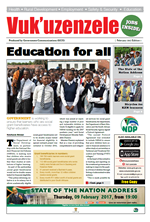
Translations
2016 Matric results show improvement
2016 Matric results show improvement andileLearners from disadvantaged schools proved that one’s circumstances don't need to stand in the way of your dreams.
Announcing the 2016 National Senior Certificate examination results in Midrand recently, Minister of Basic Education Angie Motshekga said she was impressed by the fact that poorer schools produced the best results when compared to better resourced schools.
The poverty ranking of schools in quintiles one to five revealed interesting trends.
Schools are ranked according to their level of poverty in the community surrounding the school – with quintile one being the poorest and quintile five being the least poor.
“The National Senior Certificate passes for quintiles one to three, which are also known as “no-fee” schools, combined stand at 272 615, while those of the quintiles four and five, or fee-paying schools, stand at 147 920,” she said.
The overall pass rate for the Class of 2016 improved, with 72.5 percent of all matriculants, or 442 672, passing last year’s exams.
The number of learners qualifying for admission to Bachelor studies stood at 162 374, while the number of passes with a Diploma is 179 619. 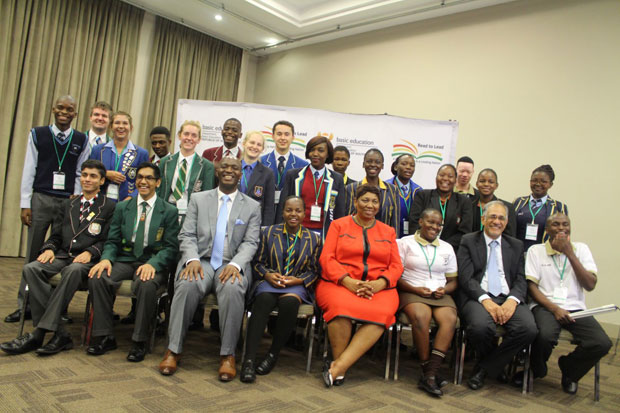
Approximately 100 486 passed with a Higher Certificate qualification while 68 passed with a National Senior Certificate.
The Minister said it was interesting to note that no-fee schools produced the most Bachelor passes.
“More interestingly, within these passes, the number of Bachelor passes for quintile 1 to 3 schools combined is 78 878; while the Bachelor passes for quintile 4 and 5 schools combined is 72 918.”
Minister Motshekga said no-fee schools combined produced
124 695 more passes than quintile four and quintile five schools combined.
“More gratifying is the fact that no-fee schools combined produced 5 960 more Bachelor passes and 58 406 Diploma passes, thus enabling the learners from these “no- fee” schools to register for Bachelor-Degrees and Diploma courses at Higher Education Institutions.
“Approximately 60 329 more learners from “no-fee” schools than those from fee-paying schools can hone their skills at TVET colleges,” she said.
The Minister said she was even more impressed by the fact that between 60 percent and 79.9 percent was registered in 1 526 quintile one to quintile three schools; while the same pass range was achieved by only 251 quintile four and quintile five schools.
“Similarly, between 80 percent and 100 percent was registered in 1 452 quintile one to quintile three schools; while the same pass ranges were achieved in only 972 quintile four and quintile five schools.”
She said 1 991 quintile one to quintile five schools registered a pass range of less than 60
percent.
Bicycles for KZN learners
Bicycles for KZN learners JoyLearners from Ntongande High School, who used to travel more than 15 km per day in order to get to school, will no longer have to do so this academic year.
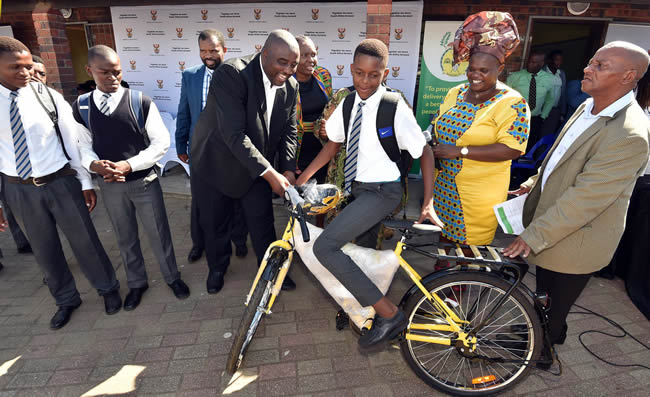 This after Communications Minister Faith Muthambi handed over bicycles to deserving learners in the rural area of Mfolozi, in KwaZulu-Natal, as part of her Back to School Campaign.
This after Communications Minister Faith Muthambi handed over bicycles to deserving learners in the rural area of Mfolozi, in KwaZulu-Natal, as part of her Back to School Campaign.
“The bicycles are intended to assist destitute students, who are in a desperate situation to get education and we are doing this because we are a caring government,” she said.
Meanwhile, the Minister also handed over multi-media centres to six schools in the Ehlanzeni District,
Mpumalanga.
Principal Samson Nkosi of Izimbali Combined School, thanked government for the well-resourced Information Communication Technology (ICT) centre the school now boasts.
The head of the farming boarding school said the centre will have a positive impact on the learners.
“They will be able to do research and write their assignments at the computer centre.
“Teachers as well are going to benefit as they will regularly visit the centre to modify their lessons and find more in-depth information about the subjects they are teaching.”
The school has 826 learners, with 30 teachers and a support staff of 29 in total.
“It is a big school and we are still growing because in 2018, we will be introducing our first Grade 12s, and we want to make it known in advance that we will get 100 percent pass rate with distinctions.”
Speaking after the launch, Minister Muthambi, who also handed over more than 350 new pairs of school shoes, said: “We are promoting equal education through exposing learners in farming and rural schools to ICT.”
Bursaries and Schools Programme improving lives
Bursaries and Schools Programme improving lives andileThe Department of Public Works’ Schools Programme will ensure that learners have job security once they have completed their studies.
The beneficiaries are obligated by the contract to work for the Department of Public Works. This means they will not struggle to find employment after graduating.
The R130 000 bursary for each learner covers tuition, accommodation, meals, textbooks, academic resources and a monthly allowance.
Public Works Minister Thulas Nxesi said the Schools Programme is part of the Seven-Year Plan to rebuild the department.
The department adopted schools throughout the country from 2013. The selection of the schools is done in collaboration with the provincial education departments. 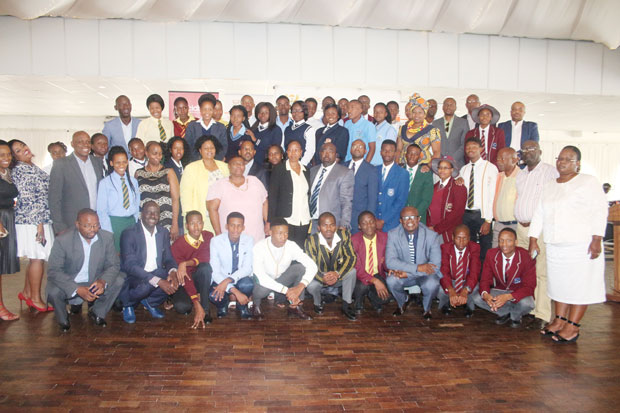
These are well-performing schools with a learner achievement of 65 percent and above in Maths and Science; schools with a potential to expand the provision of high quality maths and science teaching and learning; schools from disadvantaged communities and schools that display a commitment to hard work and success.
“We were looking for schools in disadvantaged communities that are clearly well-managed and where learners are performing well.
“In an attempt to address built environment skills shortages, Public Works adopted the Council for the Built Environment’s Skills Pipeline Strategy. The strategy spells out three interlinked intervention areas aimed at ensuring a seamless flow of professionals into the department.
“These are the Push Strategy, which is aimed at providing enough competent and skilled professionals in the built environment through supported and funded secondary and tertiary education programmes; the Intermediate Strategy, aimed at training built environment professionals through supported candidacy and mentorship programmes to the level of professional registration, and the Pull Strategy aiming at making the built environment an attractive profession through retention and continuous professional development,” the Minister said.
Claimants run winning agri-project
Claimants run winning agri-project andileResidents of Nkanini-Qwabe in Stanger, Ilembe will now be able to participate in the agricultural economy after KZN’s Agriculture and Rural Development MEC Themba Mthembu, together with the Commission for the Restitution of Land Rights, officially handed over title deeds worth R140 million to the community.
The Nkanini community was dispossessed of their land rights in 1971.
The department also launched the Qwabe-Nkanini Sugarcane Project, which received about R16 million in funding for ratoon management and infrastructure development.
Shortly after 1994, the late Inkosi Thembinkosi Gumede lodged a land claim on behalf of his community. The claimants opted for land restoration instead of financial compensation. They formed a Communal Property Association (CPA), made up of 180 households and 1 104 beneficiaries and registered an operating company known as the Qwabe-Nkanini Farming Enterprise. The board of trustees has nine members. 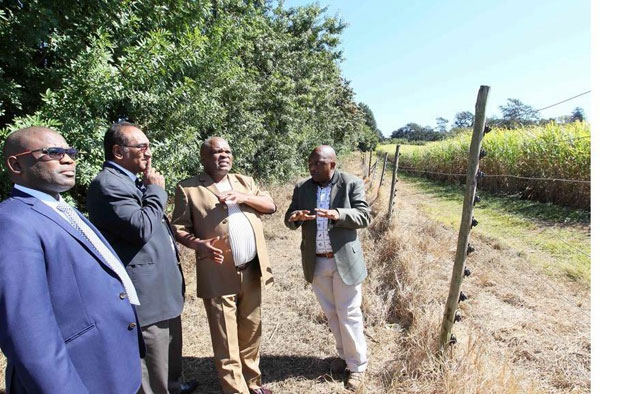
The CPA has a strategic partnership with a local farmer and also employs managers to make sure that their farming operation is a success. The enterprise grows sugarcane, bananas, macadamia nuts, litchis and cut flowers.
Inkosi Zakhele Gumede said that the people felt very blessed to get back their land.
“I can’t believe that I am holding our title deed. Thanks to the government for facilitating the process from 2009 up until today, the late Inkosi is resting well knowing that his people are finally the rightful owners of this land that was taken from them,” he said.
MEC Mthembu said the Qwabe-Nkanini Community Claim is a land reform success story.
“The beneficiaries are an example of how land reform farms can become productive and contribute to the economy and food security in the country. The launch of the R16 million Qwabe-Nkanini sugarcane project highlights the importance of partnerships in growing the agricultural sector.”
The Nkanini farming project employs 75 people but as the project develops more than 117 jobs will be created. The Qwabe Secondary Cooperative has a total of 892 beneficiaries with 349 people employed by the cooperative. An additional 87 jobs will be created.
Class of 2016 shines
Class of 2016 shines andileThe class of 2016 performed well. Here are some of the country’s top-performing achievers.
1. Top overall and best Mathematics learner
CONRAD STRYDOM, HERMANUS HIGH SCHOOL, WESTERN CAPE
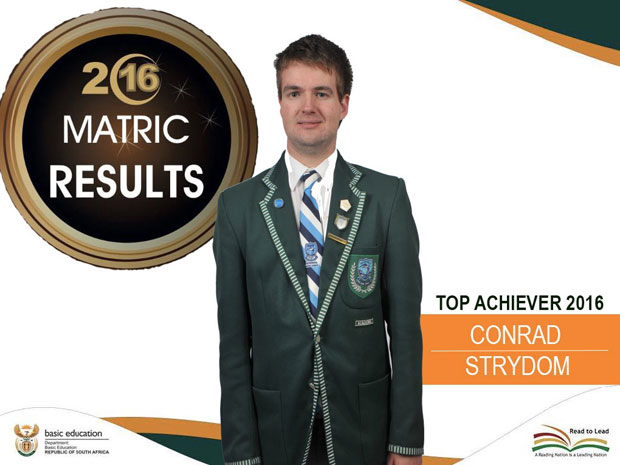
Strydom expressed his appreciation to his principal and his teachers for being dedicated and supportive in guiding him to winning Olympiads and emerging as a top achiever for his school.
“Sometimes I wish I could have gotten more time to spend on my work but on a whole, I have had a very great year and many achievements.
While he prefers not to speak about obstacles that could have affected his journey to being a top achiever, his learning abilities were quite delayed in primary school and due to problems with his eyes, he only started reading at age eight.
2. Top learner Quintile One
KARABO MOREMI, DENDRON SECONDARY SCHOOL, LIMPOPO

Having battled with the accounting subject early in the year, Moremi had to dig deep and find a solution.
By the end of the year, he says he was mastering the subject - thanks to his teachers and the effort he put into his studies.
Plans for the future include doing Actuarial Science at the University of Cape Town in record time, he said, and coming home and deciding on the way forward on how to be self-employed.
3. Top Physical Science learner
NOMAAN MULLA, HOERSKOOL ROB FERREIRA, MPUMALANGA
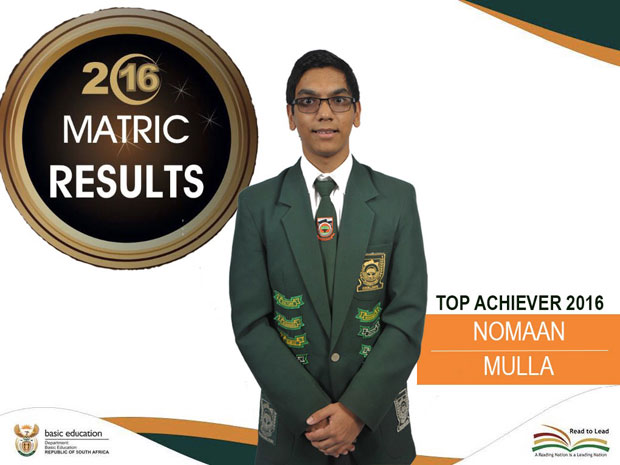
Last year Nomaam Mulla lost his grandfather who had been suffering from Alzheimer’s disease. Seeing his grandfather battle the disease over the years inspired him to pursue a career in medicine in the hope of becoming a neurosurgeon.
“I want to see how I can help other Alzheimer’s sufferers.”
He has been accepted at Wits University to pursue a degree in medicine.
4. Top learner with special education needs
ZACHARIA NYATHI, RIVONI SCHOOL FOR THE BLIND, LIMPOPO
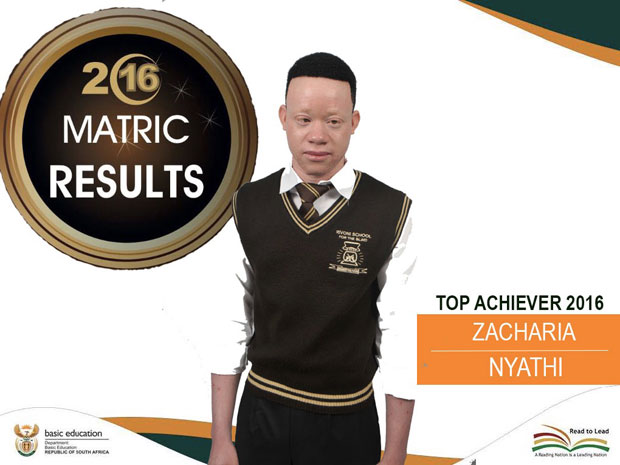
Nyathi from Mpumalanga passed Grade 12 with flying colours at the Rivoni School for the Blind in Limpopo and plans to pursue a law degree so that he can work closely with young people and represent those that are less privileged.
5. Top mathematics and physical Science learner
BRONSON RUDNER, SA COLLEGE HIGH SCHOOL, WESTERN CAPE

Rudner from Woodstock in Cape Town says he has had a good year.
He intends to study mathematics, physics, applied maths and computer science at the University of
Cape Town.
Dealing with drought and racism
Dealing with drought and racism andileCallers were invited to raise concerns with President Jacob Zuma during a recent GCIS-facilitated radio interview that gave citizens the opportunity to talk with the First Citizen.
In the interview, the President said that during a state visit to South Africa by President Edgar Lungu from the Republic of Zambia in December, both presidents noted the drought’s negative impact and pledged to work closely with the region and development partners to explore possible mitigation strategies.
Government established the Department of Water and Sanitation, which is the custodian of South Africa's water resources. It strives to ensure that all South Africans gain access to clean water and dignified sanitation.
“The fact that we have established the department and have a visionary Minister of Water and Sanitation [Nomvula Mokonyane] indicates that we are dealing with the issue,” said President Zuma. 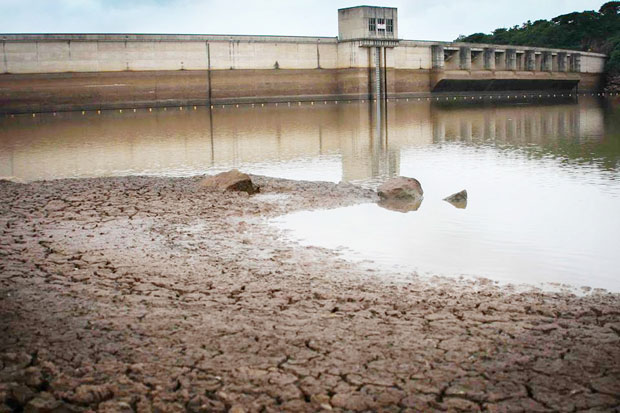
“We can’t solve this problem overnight, but we are working towards ensuring that we have enough water. Our dams will supply our people, the country and the land.”
Tackling Racism
South Africa’s biggest scourge since 1994 is racism. “Our objective is to win against racism,” said President Zuma. “When we fought the struggle one of the key things we fought against was racism. We are fighting for a non-racial country, because all people are the same. People are the image of God and colour is not an issue. But, in South Africa, racism has been institutionalised for generations.”
President Zuma explained that whilst racism is a global problem and not one only faced in South Africa, our country had to deal with removing the laws of apartheid.
President Zuma urged South Africans to talk more about racism. “Racism was brought here by people who thought that they were better than others. It’s a matter that we need to work on politically, religiously and socially and condemn those who still believe in it.”
Developing South Africa
Developing South Africa andilePresident Jacob Zuma has assured citizens that the National Development Plan (NDP) 2030 is being implemented and that the monitoring of service delivery is taken very seriously by government.
He discussed this and other issues in a Government Communication and Information System (GCIS) radio interview recently, which was broadcast by community radio stations across the country and allowed people in more rural areas access to the President.
The NDP is a detailed blueprint of how South Africa can eliminate poverty and reduce inequality by 2030. “The NDP deals with the country holistically and many things are discussed in it, including education, which is absolutely crucial for any country to develop,” said President Zuma. 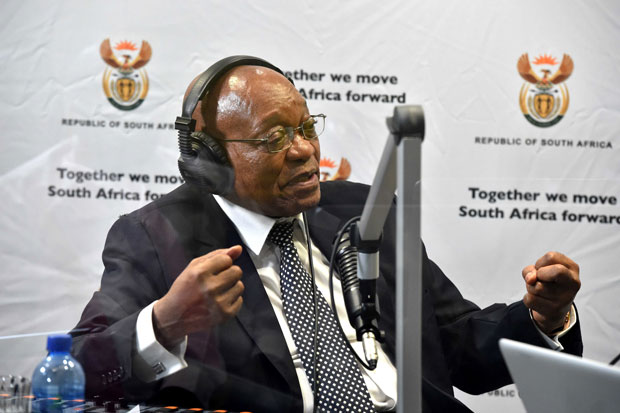
Over the past year government has made progress in the implementation of the Nine-Point Plan, which is an action plan to deliver on the socio-economic goals stated in the NDP.
President Zuma explained that the NDP will enable South Africa to achieve prosperity in a certain period of time.
“For example, we have people who depend on grants. We are looking forward to a point where we deal with this issue. We should try to reduce the number of people needing grants by empowering them so that at a given time they are able to be participants in the life and economy of the country.”
He explained that the NDP is a developmental plan. “We don't want to see people in rural areas rushing to cities. They should have everything they need, including good schools and hospitals, in the areas where they live. This is why the NDP is a product of the people – everyone participates in developing the plan and everyone agreed on it, so we are all working to achieve the same things.”
A caller from Centurion, in Tshwane, thanked President Zuma for the good work done by government in building houses in Olievenhoutbosch. Government has delivered more than 4.3 million houses and subsidies across the country since 1994. “We are still working hard on the problems that we have had for centuries, but I am glad that the community sees what we are doing,” said President Zuma.
Government established the Department of Performance Monitoring and Evaluation to ensure service delivery.
“This department needs to have offices in all provinces and municipalities so that we can make the department bigger and stronger and be everywhere we need to be to be able to talk to the people, monitor service delivery and report back.
"This way we will be able to immediately discover some of the problems, mistakes and people who might be doing wrong things because monitoring is one of the most important instruments of government.” 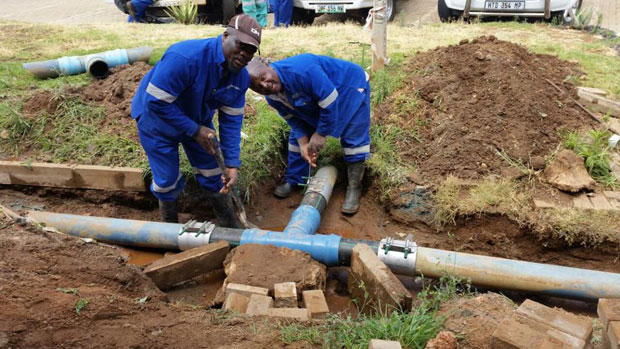
Education for all
Education for all JoyThe Department of Social Development, in partnership with the National Student Financial Aid Scheme (NSFAS), is making sure that children who receive social grants are able to further their studies at institutions of higher learning.
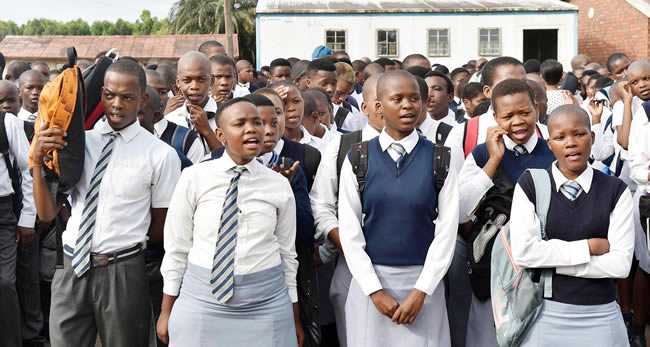
As part of the partnership, social grant beneficiaries would not be double means tested for financial eligibility.
“This policy-reforming initiative is in its infancy but it allows academically eligible social grant beneficiaries not to be double means tested for financial eligibility. A special outreach project was initiated in October 2016, which was aimed at reaching a large number of poor and vulnerable children in Grade 12 eligible to apply for NSFAS funding for the 2017 academic year,” said Social Development Minister Bathabile Dlamini.
Grant beneficiaries in numbers:
- 188 758 matric learners were social grant beneficiaries.
- 112 409 social grant beneficiaries who wrote matric were female and live in Gauteng and KwaZulu-Natal
- 41 percent received a Bachelor’s pass.
- Every month, more than 12 million children receive social grants
- Every month R11 billion worth of social grants are distributed to poor South Africans
Minister Dlamini explained that as a way of providing comprehensive and integrated services for social grant beneficiaries, her department, the Department of Basic Education and the South African Social Security Agency signed a Protocol Agreement.
“The current Protocol Agreement was extended to include NSFAS to ensure that poor children have access to financial assistance to either study at universities or Technical and Vocational Education and Training (TVET) colleges.”
At the heart of this initiative is tracking and reporting on the investment government is making to improve the quality of lives of children through linking of administrative data systems.
“This is made possible by using the identity number as a unique number or variable to any administrative data and matching various data systems in order to determine the extent to which children access services and interventions that government provides.”
Performance of Grade 12 pupils on social grant
Minister Dlamini also highlighted the performance of Grade 12 learners who received social grants. This included children living in child- and youth-headed families and those in foster care families.
She added that her department has put in place measures that look after children in child- and youth-headed households through the department’s Isibindi programme. The programme deploys child and youth care workers in communities to assist children in vulnerable homes.
Minister Dlamini said the programme has a special focus on Grade 12 learners and in 2016, 3 400 matriculants were part of this programme.
“The assistance by Isibindi child and youth care workers ensures that our children remain in school and attend classes. The child and youth care workers support these children and make sure that they are relieved of household responsibilities, including being parents to their siblings while they are trying to pass Grade 12.”
Minister Dlamini said out of the over 600 000 full-time learners who wrote matric 188 758 were social grant beneficiaries
“Out of this total 178 411, beneficiaries actually wrote their examinations about 95 percent. This suggests that over 10 000 grant recipients dropped out of school before sitting for their final examinations. We commit to investigating reasons for this dropout.”
She said despite the conditions of vulnerable children 41 percent managed to receive a Bachelor’s pass, which gives them entry to any tertiary education institution. The majority of the learners who obtained a Bachelors Pass were from KwaZulu-Natal and Gauteng.
Free State aims even higher
Free State aims even higher andileFree State learners took top honours as they produced the highest number of learners who passed their Grade 12 examinations.
With the province breaking the national threshold of a 90 percent pass rate, MEC for Education Tate Makgoe is aiming for higher results in 2017. The target for the pass rate for the province is 95 percent for the class on 2017.
The Free State had aimed for a 90 percent matric pass rate for 2016, but exceeded this to 93,2 percent.
“We have broken our own record, and this is highly significant for us. We are the first province to reach the 90 percent benchmark.
“If you compare us to Independent Education Board schools, there’s only about 6 percent difference between us,” he said.
MEC Makgoe looked back to four years ago in 2012, when the province achieved a pass rate of 81.1 percent for the first time. 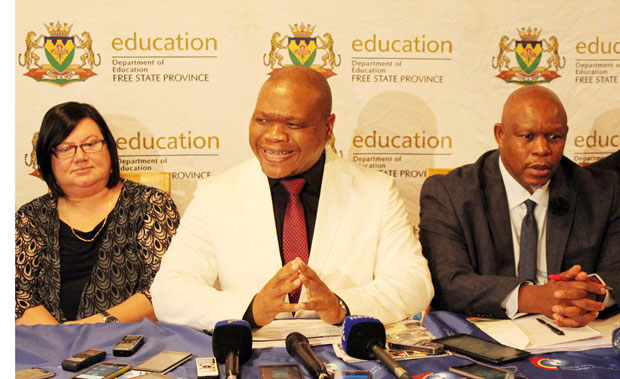
He said the increase in the pass rate is “a lesson for us as Free Staters, that if we pool resources and work together many problems that we have can be overcome”.
“For the first time the Free State department of education is a model for the rest of South Africa. There was no magic, just hard work. We focused on what needs to be achieved, and we achieved it,” said MEC Makgoe.
Some of the programmes that provincial department undertook to assist matriculants with their studies included running revision programmes at community radio stations with highly qualified and successful subject advisors, hosting study camps for learners and giving the pupils motivational talks.
Acting Premier and MEC for Treasury in the province, Elsabe Rockman acknowledged the “culture of collective ownership,” in the Free State, adding that they have taken responsibility and made efforts to reach this success.
“Never underestimate the power of small provinces with small resources; we can compete with the best in the country and the world, and beat them at that,” he said.
In preparation for reaching the 95 percent pass rate for the class of 2017, the provincial government took about 3 000 learners from across the province to camps in December to prepare them for the year ahead.
Giving children a head start
Giving children a head start andileSouth Africa needs to get the foundation of education right if it is to realise the goals set out in the National Development Plan (NDP).
It is for this reason that the Early Childhood Development (ECD) programme is one of the priorities of government, says Social Development Minister Bathabile Dlamini.
She said government especially acknowledges and understands the importance of a child's first
1 000 days.
“We need to ensure that every child between the ages of zero and four has access to ECD. To achieve this, as a country we have a national integrated policy on ECD which was approved by Cabinet last year.”
The National Integrated Early Childhood Development Policy gives direction and facilitates the provision of a comprehensive package of early childhood development services for all infants and young children, including children with special needs, children with disabilities and other developmental challenges.
It will ensure the best possible start in life for all children and contribute to the long-term prosperity of the country.
Minister Dlamini said about 1 343 336 children have access to ECD and it is government’s commitment to ensure that no child is “left behind” in this regard.
“Government would like to encourage parents to take their children to ECD centres ,and ECD practitioners to
register their centres,” said the Minister.
High hopes for SoNA 2017
High hopes for SoNA 2017 JoyOne of the most keenly watched events on the public calendar is the annual delivery of the State of the Nation address (SoNA) byThe President.
On this occasion the President reports on the status of the nation, normally to a joint sitting of Parliament (the National Assembly and National Council of Provinces). The speech is also broadcast on television for the benefit of citizens.
Given the sluggish economy, weak rand and high rate of unemployment, South Africans will be keen to hear plans for tackling the country’s challenges when President Jacob Zuma delivers his 2017 SoNA.
Vuk'uzenzele took to the streets to find out what issues citizens hope the President will talk about.
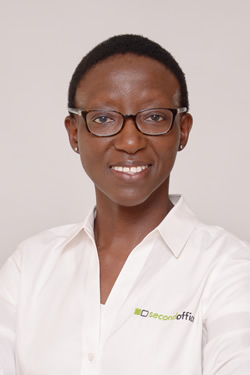 Sibongile Booi, Founder of Second Office
Sibongile Booi, Founder of Second Office
For South Africa I would like see an economy that is growing at healthy levels. Economic growth entails improved employment opportunities and an environment where the average South African is doing well. I believe that if more of us do well, we will rid our society of a lot of the ills.
Also with such a high unemployment rate the practical way to solve unemployment would be to promote entrepreneurship to take advantage of the vast opportunities.
It is important to have a diversity in the opportunities entrepreneurs pursue to improve the chances of survival.
To succeed at such initiatives, government is there to lead the way. For longevity, it will require various arms of society.
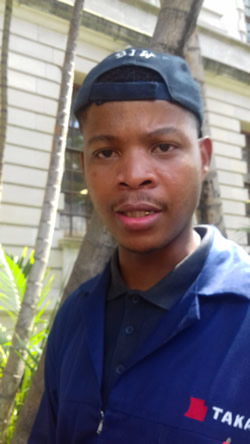 Muzi Madlala (30)
Muzi Madlala (30)
“I’m expecting government to equip more young people with skills. If young people are given skills, they will not become involved in criminal activities. I am expecting the President to talk more about involvement the of young people in the agricultural sector, not as labourers but as processors as well.”
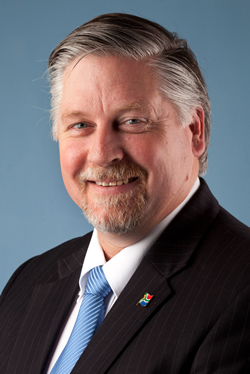 Kevin Hustler (Nelson Mandela Bay Business Chamber CEO)
Kevin Hustler (Nelson Mandela Bay Business Chamber CEO)
“A holistic approach to not only address the challenges in the tertiary education system, but all levels of education in South Africa to provide suitably trained workplace-ready employees, remains one of the key national priorities that we want sufficiently addressed in SoNA 2017. We also would like SoNA 2017 to address transparent and open business dealings and opportunities within the country’s energy master plan, particularly in the areas of nuclear and renewable energy.”
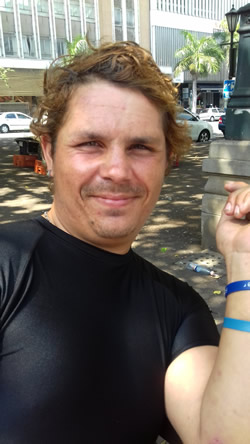 Peter Jonke (38)
Peter Jonke (38)
“I am expecting the President to talk more on tertiary education. We need to know how they are going to tackle the fees must fall issue. Secondly, I would like him to address the issue of the economy and what strategy government will use to attract foreign investors.”
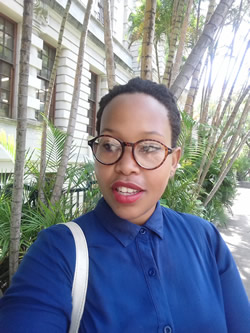 Nompilo Sikhakhane (24)
Nompilo Sikhakhane (24)
“My expectations of the SoNA is that government offers free education to students from disadvantage of families. Some of the students really deserve free education, especially those who are dependent on foster grants from primary to high school."
Improving lives of learners
Improving lives of learners JoyMbali Shamu, 18, is one of the more than 100 000 girls on social grants who wrote their matric exams. She is seizing the opportunities provided to her to make her life better for herself.
Shamu received seven distinctions and is on her way to be a BSc Actuarial Science student at the University of the Witwatersrand.
This would not have been possible without the support of the Department of Social Development and the National Student Financial Aid Scheme (NSFAS) who are ensuring that children on social grants get to further their studies at institutions of higher learning.
Minister of Social Development Bathabile Dlamini said she was particularly pleased with the performance of girl learners.
“I am very pleased to announce that the girl child continues to take all the opportunities given by government. We want to report that 112 409 of the total number of social grant learners who wrote matric were female and they live in Gauteng and KwaZulu-Natal.”
About 188 758 matric learners were social grant beneficiaries.
Shamu was a student at Esokwazi Secondary School in Sebokeng, near Johannesburg, and even though she walked 10 km every day to go to school, she stayed focused on her goal.
Shamu lives with her grandmother, who is a domestic worker, and her unemployed mother. Their survival is based on the social grant she gets from government.
“I am very grateful for the opportunities provided to me by government. I wish they go further and assist as many children as possible.”
Minister Dlamini said what concerned her the most was that out of the 188 758 learners who were social grant beneficiaries and wrote their matric, only 66 002 were boys.
“We need to be concerned about the boy child and it is time that we pay attention to our boys,” she said.
Thabo Ntsime, 17, on the other hand, also passed his matric and received two distinctions, in geography and life orientation.
Ntsime, from Mohlakeng in Randburgs lost both his parents and was raised by his unemployed grandparents.
“My grandparents have always been the ones who give me all the support, making sure that I had food and clothing even though they were not working.”
Ntsime will be studying Emergency Medical Services at the University of Johannesburg.
Ntsime said Isibindi helped him to cope with the studies and encouraged him to be better.
“They encouraged me to get a better life. I would like to take my grandparents from that poor household to a better life.”
Jobs: Department of Social Development
Jobs: Department of Social Development andileIt is our intention to promote representivity (race, gender and disability) in the Public Service through the filling of these posts and candidates whose transfer / promotion/ appointment will promote representivity will receive preference.
Post: Deputy Director-General: Comprehensive Social Security (Ref: E1/A/2017).
Total Package: R1 299 501 per annum
Centre: HSRC Building, Pretoria.
This inclusive remuneration package consists of a basic salary, the states’ contribution to the Government Employees Pension Fund and a flexible portion that may be structured i.t.o. the applicable rules.
Requirements: An appropriate Bachelor’s Degree or equivalent qualification (NQF level 7) and a post graduate qualification (NQF level 8) as recognised by SAQA PLUS a minimum of 8 to 10 years of relevant experience at a senior managerial level. Knowledge of the relevant Public Service Regulatory Framework. Knowledge of acts governing the implementation of social development services and programmes. Understanding and knowledge of comprehensive social security and the legislative framework, systems, processes and programmes. Competencies: Strategic capability and leadership skills. Programme and project management skills. Financial management skills. Policy analysis and development skills. Information and knowledge management skills. Communication (written and verbal) skills. Service delivery innovation skills. Problem-solving and change management skills. People management and empowerment skills. Client orientation and customer focus skills. Stakeholder management skills. Presentation, facilitation and coordination skills. Attributes: Good interpersonal relations. Ability to work under pressure. Innovative and creative. Independent thinker. Ability to work in a team and independently. Cultural sensitivity. Adaptability. Confidentiality. Political sensitivity. Diplomatic. Cost consciousness. Honesty and integrity.
Responsibilities: Manage and provide leadership in the review and development of comprehensive social security (Social insurance, social security, appeals and inspectorate) legislative, regulatory and compliance frameworks. Manage the operations of the Inspectorate for Social Assistance and the development of the appropriate institutional form and relevant frameworks. Manage the provisioning of social security budgeting, modeling and forecasting services. Manage and coordinate the implementation of the social security reform programmes. Manage the operations of social assistance appeals. Provide advice and guidance to the social development sector, cluster and participate in various fora in relation to comprehensive social security.
In terms of the Department’s employment equity target, African, Coloured and White males and African, Coloured and Indian females as well as persons with disabilities are encouraged to apply.
Enquiries: Mr Z Dangor
Tel: 012 312 7647
Post: Chief Director: Strategy And Change Management
Branch: Chief Operations Office (Ref. E1/B/2017)
Total Package: R1 068 564 per annum
Centre: HSRC Building, Pretoria
This inclusive remuneration package consists of a basic salary, the state’s contribution to the Government Employees Pension Fund and a flexible portion that may be structured i.t.o. the applicable rules.
Requirements: A Bachelor’s Degree or equivalent qualification (NQF level 7) as recognised by SAQA in the strategic management related field PLUS 5 years experience at senior management level in strategy development. A Masters Degree will be an added advantage. Knowledge and understanding of governance issues in the public sector. Knowledge and understanding of government reporting requirements. Knowledge and understanding of sector strategic management frameworks. Knowledge and experience in diversity and gender management. Knowledge and understanding of the Social Development Programmes would be an added advantage.
Competencies: Client Orientation and Customer Focus Skills. Presentation skills. Computer literate. Strategic management Skills. Communication (Written and verbal) skills. Project management skills. Planning and organising skills. Analytical skills. Problem solving skills. People management and empowerment skills. Facilitation skills. Attributes: Good interpersonal relationship. Ability to work under pressure. Innovative and creative. Ability to work in a team and independently. Gender expert.
Responsibilities: Oversee the development and implementation of the Department’s strategic plan. Oversee the development and mainstreaming of gender policies. Develop and drive long-term strategies and initiatives together with stakeholders and partners throughout the Department. Oversee the development and maintenance of business improvement processes that would support the Department’s mission, vision, goals and objectives. Provide guidance to the Senior Management in the development of operational plans. Ensure efficient and optimal organizational performance and use of resources. Develop and maintain a risk management strategy.
In terms of the Branch’s employment equity target, Coloured, Indian & White males and African females as well as persons with disabilities are encouraged to apply.
Enquiries: Ms N Vilakazi
Tel: (012) 312-7293
Post: Chief Director: Professional Social Services and Older Persons
Branch: Specialised and Professional Services (Ref. E1/C/2017)
Centre: HSRC Building, Pretoria
Total Package: R1 068 564 per annum
This inclusive remuneration package consists of a basic salary, the state’s contribution to the Government Employees Pension Fund and a flexible portion that may be structured i.t.o. the applicable rules.
Requirements: An appropriate Bachelor’s Degree in Social Work or equivalent qualification (NQF level 7) as recognized by SAQA PLUS 5 years’ experience at a senior managerial level. Registration with the SA Council for Social Service Professions as a Social Worker. Knowledge and understanding of i) government macro-economic and social policies; ii) relevant Public Service legislation, iii) integrated social work legislation, policies and programmes; iv) Older Persons Act and other legislation that has an impact on older persons; v) Treasury Regulations; vi) public management and administration principles; vii) Public Finance Management Act; viii) White Paper on Transformation of Social Welfare; x) policies such as MTSF, NDP, MTEF etc; xi) management of strategic plans, business plans and budgeting, xii) financial prescripts of the Public Service, costing methodologies and performance measurement, and xiii) Public Service Statutory Framework.
Competencies: Strategic capability and leadership. International relations engagement. Programme and project management. Financial management and administration. Policy analysis and development. Information and knowledge management. Communication. Computer literacy. Service delivery innovation. Problem solving and change management. People management and empowerment. Client orientation and customer focus. Stakeholder Management. Presentation and facilitation. Risk Management. Financial analysis and reporting. Attributes: Good interpersonal relations. Ability to work under pressure. Innovative and creative. Ability to work in a team and independently. Adaptability. Diplomatic. Independent thinker. Cost consciousness. Honesty and Integrity
Responsibilities: Manage and facilitate the development of policies, strategies and programmes relating to the delivery of services to older persons. Coordinate the implementation of the national scholarship programme for social service professionals and facilitate partnership programmes with retired social workers for social development services and sectors. Manage the development and implementation of norms and standards to inform the delivery of services to older persons. Manage and coordinate the implementation of social service provider support services. Coordinate and facilitate the implementation of service standards, quality assurance and governance programmes. Provide planning and implementation guidance to the social development sector and clusters as well as participate in various fora in relation to social professional services and older persons programmes. Develop policies and strategies to recruit and retain social services professionals and provide training initiatives for social work programmes.
In terms of the Branch’s employment equity target, African, Coloured and White males as well as persons with disabilities are encouraged to apply.
Enquiries: Ms CG Nxumalo
Tel: (012) 312-7386
Post: Chief Director: Child Protection
Branch: Children, Families and Professional Services (Ref. E1/D/2017)
Centre: HSRC Building, Pretoria
Total Package: R1 068 564 per annum
This inclusive remuneration package consists of a basic salary, the state’s contribution to the Government Employees Pension Fund and a flexible portion that may be structured i.t.o. the applicable rules.
REQUIREMENTS: An undergraduate qualification in Social Sciences (NQF level 7) as recognized by SAQA or equivalent qualification PLUS a minimum of 5 years relevant senior management experience in Children’s Services. Registration with the South African Council for Social Services Professions as a Social Worker. Knowledge of relevant Public Service legislation, the Children’s Act and the Child Protection Register. Understanding of the National Adoption Register, strategies and guidelines of Child Abuse, Neglect and Exploitation (CANE).
Competencies: Strategic capability and leadership skills. Programme and project management skills. Financial management skills. Policy analysis and development skills. Information and knowledge management skills. Communication skills. Service delivery innovation skills. Problem solving and change management skills. People Management and empowerment skills. Client orientation and customer focus skills. Stakeholder management skills. Presentation and facilitation skills. Attributes: Good interpersonal relationship. Ability to work under pressure. Innovative and creative. Ability to work in a team and independently. Adaptability. Diplomatic. Independent thinker. Cost consciousness. Honesty and Integrity
Responsibilities: Manage and monitor the child protection register. Manage and monitor the provision of national and inter-country adoption services. Manage the development of policies, strategies, guidelines and programmes for children’s protection: (a) Children placed in alternative care such as foster care, child and youth care centres and temporary safe care; (b) Child abuse and neglect and exploitation (CANE). Promote child protection services.
In terms of the Branch’s employment equity target, African, Coloured and White males as well as persons with disabilities are encouraged to apply.
Enquiries: Ms C Nxumalo
Tel: 012 312 7386
Post: Chief Director: Npo Registration, Support, Compliance And Monitoring
Branch: Community Development (Ref. E1/E/2017)
Centre: HSRC Building, Pretoria
Total Package: R1 068 564 per annum
This inclusive remuneration package consists of a basic salary, the state’s contribution to the Government Employees Pension Fund and a flexible portion that may be structured i.t.o. the applicable rules. Requirements: An appropriate Bachelor’s Degree or equivalent qualification (NQF level 7) as recognised by SAQA PLUS five years senior management experience in the field of NPO governance or administration. Knowledge of the relevant Public Service legislation. Knowledge and understanding of the NPO legal framework.
Competencies: Strategic capability and leadership skills. Programme and project management skills. Financial management skills. Communication skills. Policy analysis and development skills. Information and knowledge management skills. Service delivery innovation. Problem solving and change management skills. People management and empowerment skills. Client orientation and customer focus. Stakeholder management skills. Presentation and facilitation skills.
Attributes: Good interpersonal relationship. Ability to work under pressure. Innovative and creative. Ability to work in a team and independently. Confidentiality. Adaptability. Diplomatic. Independent thinker. Cost consciousness. Honesty and integrity.
Responsibilities: Manage the implementation and review of regulatory, legislative, and operational framework to ensure effective delivery of NPO services. Manage the development and maintenance of an efficient NPO administrative and information management system for the registration and administration of the registered organisations. Manage the development and implementation of NPO compliance monitoring and reporting framework and coordinate related legal compliance processes. Manage the development and effective implementation of stakeholder management framework to ensure effective governance and stakeholder participation. Manage the design and the provision of NPOs service delivery improvement and institutional capacity building programmes. Manage the design of effective customer care response, feedback mechanism and communication systems to enhance client relations. Provide advice and guidance to the social development sector and participate in various fora in relation to NPO matters.
In terms of the Branch’s employment equity target, Coloured and White males and African, Coloured and White females as well as persons with disabilities are encouraged to apply.
Enquiries: Mr P Netshipale
Tel: (012) 312 7662
Post: Chief Director: HIV and AIDS
Branch: Specialised and Professional Services (Ref. E1/F/2017)
Centre: HSRC Building, Pretoria
Total Package: R1 068 564 per annum
This inclusive remuneration package consists of a basic salary, the state’s contribution to the Government Employees Pension Fund and a flexible portion that may be structured i.t.o. the applicable rules.
Requirements: An undergraduate qualification (NQF level 7) as recognised by SAQA PLUS 5 years senior management experience in implementing prevention, care and support HIV and AIDS programmes or in a relevant field. Relevant post graduate degree will be an added advantage. Knowledge of the public service legislation. Knowledge and understanding of HIV and AIDS national strategy as contained in the National Strategic Plan for HIV and AIDS and STI. Knowledge of HIV and AIDS in a social and economic context. Knowledge and understanding of human behavior and social systems. Knowledge and understanding of Social Development policies and programmes pertaining to HIV and AIDS.
Competencies: Strategic capability and leadership skills. Programme and project management skills. Financial management skills. Policy analysis and development skills. Information and knowledge management skills. Communication (written and verbal) skills. Service delivery innovation skills. Problem solving and change management skills. People Management and empowerment skills. Client orientation and customer focus skills. Stakeholder management skills. Presentation and facilitation skills. Research skills. Monitoring and Evaluation skills.
Attributes: Confidentiality. Ability to work under pressure. Innovative and creative. Ability to work in a team and independently. Adaptability. Diplomatic. Independent thinker. Cost consciousness. Honesty and Integrity. Self-Starter. Assertiveness.
Responsibilities: Provide strategic direction in the review and development of legislative framework (policies, strategies, guidelines and programmes) to guide the implementation of the relevant Social development strategies and programmes as guided by the National Strategic Plan for HIV and AIDS. Lead the implementation of the Comprehensive Strategy of the Department of Social Development in addressing the social and structural drivers of HIV and AIDS across the public service. Lead and collaborate with other government departments, SANAC structures and relevant stakeholders in ensuring the implementation of behavioural change, prevention and response mechanisms in relation to social drivers of HIV and AIDS. Manage the implementation of the National Action Plan in mitigating the impact of HIV and AIDS on key population. Lead the implantation of Home and Community based care and support programs including the strengthening of community systems for ensuring community response. Ensure the alignment of the prevention, care and support strategies with other social development programmes to strengthen community and family systems. Lead and oversee the design and implementation of quality assurance and monitoring framework to ensure compliance to policies, norms and standards. Oversee research and impact assessment processes on the implementation of HIV and AIDS. Represent the department in all relevant forums and advise the Director-General, Minister and social development sector on issues pertaining to HIV and AIDS.
In terms of the Branch’s employment equity target, African, Coloured and White males as well as persons with disabilities are encouraged to apply.
Enquiries: Ms C Nxumalo
Tel: (012) 312 7386
Post: Director: Legal Case Assessment and Adjudication
Chief Directorate: Social Assistance Appeals (Ref. E1/G/2017)
Centre: Harlequins Office Park, Groenkloof
Total Package: R898 743 per annum
This inclusive remuneration package consists of a basic salary, the states’ contribution to the Government Employees Pension Fund and a flexible portion that may be structured i.t.o. the applicable rules.
Requirements: An appropriate recognised Law Degree or equivalent qualification (NQF Level 7) PLUS 5 years’ relevant experience at a middle or senior management level within the administrative law. Knowledge of interpretation and implementation of Social Assistance Legislation and Administrative Justice.
Competencies Financial management skills. Project management skills. Communication (verbal and written) skills. Planning and Organising Skills. Strategic capability and leadership skills. Customer Care Skills. Analytical Skills. Monitoring and evaluation skills. Presentation and facilitation skills. Negotiation skills. Computer skills. Research skills. Problem-solving skills. Coordination skills. Attributes: Assertive. Ability to work in a team and independently. Compliant. Diplomatic. Ability to work under pressure. Decisive. Adaptive. Confident. Accurate. Self-starter. Trustworthiness.
Responsibilities: Coordinate Legal Case Assessment Services. Oversee the effective functioning of the Adjudication and Post Adjudication processes within the policy framework. Manage terms of conduct, proceedings and enlistment of the Panel Members of the Tribunal. Coordinate and manage training of Panel Members of the Tribunal relating to the Regulatory Framework. Develop, implement and review norms, standards and forms for Legal Case Assessment, Adjudication and Post Adjudication in line with the Social Assistance Act and regulations and compatibility with Administrative Justice Legislation. Conduct quality assurance on adjudicated files to ensure compliance to norms and standards of Adjudication. Coordinate strategic or period specific reports on the status of appeals and recommend policy reviews.
In terms of the Chief Directorate’s employment equity target, African males and females as well as persons with disabilities are encouraged to apply.
Enquiries: Adv A Brink
Tel: 012 741 6846
Post: Director: Medical Case Assessment and Adjudication
Chief Directorate: Social Assistance Appeals (Ref. E1/H/2017)
Centre: Harlequins Office Park, Groenkloof
Total Package: R898 743 per annum
This inclusive remuneration package consists of a basic salary, the states’ contribution to the Government Employees Pension Fund and a flexible portion that may be structured i.t.o. the applicable rules.
Requirements: A MBChB Degree or equivalent qualification (NQF level 7) PLUS five (5) years of experience at a middle/senior management level in the medical field. Registration as medical practitioner with the HPCSA. Knowledge of the applicable legislation, Medical Practices and Guidelines.
Competencies: Financial management skills. Communication (written and verbal) and liaison skills. Planning and organising skills. Strategic capability and leadership skills. Problem-solving skills. Analytical skills. Project management skills. Computer literacy. Presentation and facilitation skills. Customer care skills. Monitoring and evaluation skills. Negotiation skills. Research skills. Coordination skills.
Attributes: Assertiveness. Ability to work independently and as part of a team. Compliance. Diplomacy. Ability to work under pressure. Decisiveness. Adaptability. Confident. Accuracy. Compliant. Self-starter. Trustworthiness.
Responsibilities: Manage medical adjudication services by ensuring verification of correctness and completeness of medical reports, examining medical correspondence, scheduling appeals for adjudication (where applicable), responding to medically related correspondence and liaising with medical role players, where applicable. Coordinate and perform medical case assessments by assessing appeals for medically related social grants applications based on the application of applicable legislation, policy, medical guidelines, medical practice, interpretation and analysis and compliance thereto, and examining appeals in the light of medical evidence and prevailing circumstances in respect of the decision taken by the SASSA as well as validating and confirming medical evidence. Provide strategic direction and support the medical appeals process. Ensure development, implementation, monitoring and evaluation of the compliance system. Do quality assurance of adjudicated appeals.
In terms of the Chief Directorate’s employment equity target, African males and females as well as persons with disabilities are encouraged to apply.
ENQUIRIES: Adv A Brink, Tel: 012 741 6846
APPLICATIONS: The Director General, Department of Social Development, Private Bag X901, Pretoria, 0001, Physical Address: HSRC Building, 134 Pretorius Street.
FOR ATTENTION: Ms E Steenkamp
CLOSING DATE: 03 March 2017
NOTE: Curriculum vitae with a detailed description of duties, the names of two referees and certified copies of qualifications and identity document must accompany your signed application for employment (Z83). In the event of hand delivery of applications, applicants must sign an application register book as proof of submission. All shortlisted candidates for SMS posts will be subjected to a technical exercise that intends to test relevant technical elements of the job, the logistics of which will be communicated by the Department. Following the interview and technical exercise, the selection panel will recommend candidates to attend a generic managerial competency assessment (in compliance with the DPSA Directive on the implementation of competency based assessments). The competency assessment will be testing generic managerial competencies using the mandated DPSA SMS competency assessment tools. The successful candidate will sign an annual performance agreement, complete a financial discloser form and will also be required to undergo a security clearance. If the candidate is applying for an OSD post, certificates of service must be attached to the CV. It is the applicant’s responsibility to have foreign qualifications evaluated by the South African Qualification Authority (SAQA). Failure to submit the requested documents will result in your application not being considered. Personnel suitability checks will be conducted on short listed candidates and the appointment is subject to positive outcomes of the checks. Correspondence will be limited to shortlisted candidates only. The selection of candidates will be done with due regard to the relevant aspects of the selection process as set out in the Public Service Regulations, 2016 Chapter 4/67. Applications received after the closing date will not be taken into consideration. No faxed or e-mailed applications will be considered. If you have not been contacted within three months after the closing date of this advertisement, please accept that your application was unsuccessful.
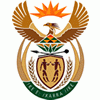
Let us transform South Africa
Let us transform South Africa Joy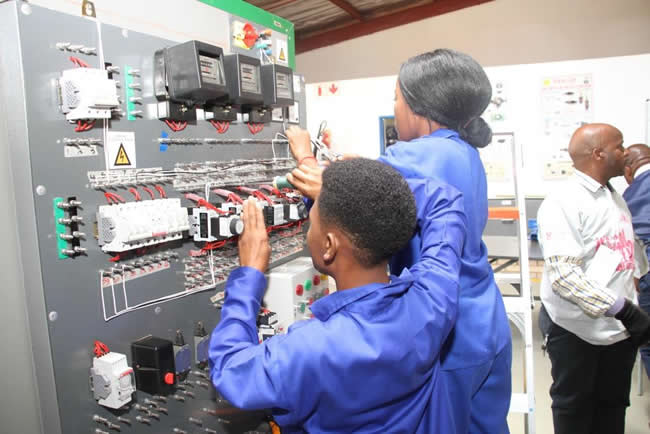 I would like to extend to Vuk’uzenzele readers my best wishes for 2017 as a year in which our country must take serious steps to reduce poverty, unemployment and inequality.
I would like to extend to Vuk’uzenzele readers my best wishes for 2017 as a year in which our country must take serious steps to reduce poverty, unemployment and inequality.
As learners and workers settle in behind their desks, factory equipment, steering wheels and mining drills, we greet 2017 with the determination that this must be a year in which we transform South Africans.
It is a sad fact that many South Africans will not be behind desks, factory equipment, steering wheels or mining drills because they do not have the skills or the jobs to be in those positions.
These compatriots must be the focus in 2017 of all our efforts to improve social and economic conditions in our country.
We have every reason to be proud of our nation’s achievements in 2016. It was a year in which we made progress in extending services to our people including housing, water, electricity, accessible education, health care, roads, transport, social grants and in fighting hunger through public employment schemes and other programmes.
In 2016, government, business and labour worked together closely to support our economy and ward off the risk of South Africa being downgraded by international ratings agencies.
We have every reason to congratulate the matric Class of 2016 on attaining their passage into the world of work or into tertiary education, but we know too well that there are tens of thousands of recently qualified matriculants who have simply been added to worrying numbers of South Africans who are already unemployed.
2017 is a year in which South Africans must be united in working together to create a better life for all. Building South Africa will require compromise and sacrifice from every single one of us.
We call on all South Africans to contribute, each according to his or her ability. We call on the private sector to work with government and organised labour to increase their contribution in areas such as manufacturing and construction.
This will create more jobs. We call on artists, athletes, academia, the faith-based sector and other civil society formations to do what they can within their sectors to strengthen and build our nation.
This is a year in which government would like to see more South Africans taking up the wide range of opportunities that have been created over a number of years to ensure that we have more black South Africans participate in our economy, and to empower women in particular.
I invite all South Africans to visit municipal, provincial and national government offices and websites to find our more about opportunities in education, from student financing to internships; in public employment programmes; in funding for township businesses and rural enterprises; in financial assistance to help small businesses market themselves internationally; in incentives that make it easier for more businesses to employ more people.
I urge all South Africans to make this year of exploring all the opportunities that do exist to make life better for the individual and to improve our economy.
We need to change the commanding heights of the economy, and increase the participation of black people as owners and managers.
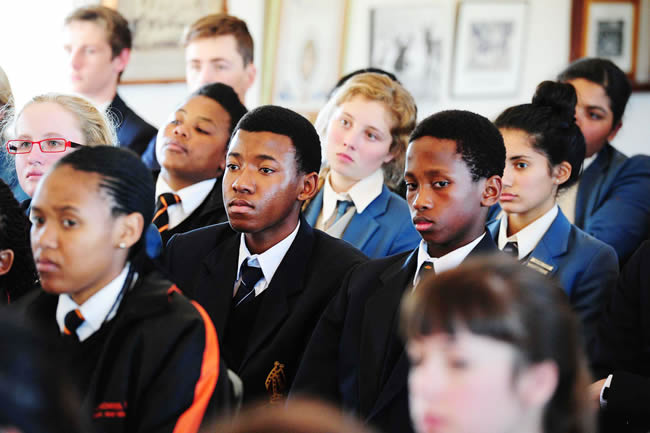 We also need to step up our fight against racism.
We also need to step up our fight against racism.
All institutions and businesses must promote inclusion and non-racialism. Nobody must be excluded on the basis of colour or race, through subtle and unconstitutional means.
While we focus on our national tasks for 2017, we must always remain mindful of our journey through history.
This year, we will celebrate the centenary of His Excellency Oliver Reginald Tambo, the late President of the ANC and national hero who worked tirelessly so that all South Africans can live in peace, freedom and democracy.
Secondly, we will mark the centenary of the sinking of the ship, the Mendi, in which scores of black soldiers died on 21 February 1917.
The two centenaries must be used to unite all our people in appreciation of what the country has achieved against all odds, in building a new society from the ashes of apartheid colonialism.
As we work in 2017 to make this a year of jobs and non-racialism. It must be a year in which we work harder to place land in the hands of black South Africans.
Importantly, it must be the year of unity in action, South Africans working together to move South Africa forward!
Let this be a successful year for all!
Mentors help improve education in EC
Mentors help improve education in EC andileAs part of developing a functional school system and ensuring that children have access to quality education, the Eastern Cape Department of Education has called on former officials to help revive education in the province.
The Eastern Cape Department of Education has called on 150 retired departmental officials to help uplift 560 disadvantaged schools in the province.
The retired officials will mentor these schools with their knowledge and experience, especially when dealing with the high number of Grade 12 enrolments.
David Toni, who was a school principal for 16 years and later became a circuit manager for 20 years, said he was pleased to share his skills and mentor people in the education sector. 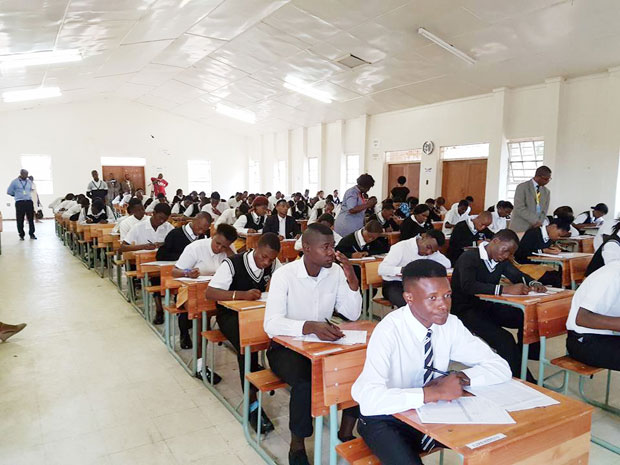
“A well-mentored principal will pass down their skills to staff members and educators. This means that the whole school will function optimally and the overall results of learners will improve,” said Toni during the launch of the programme.
Through this programme, the Eastern Cape Department of Education wants to improve learners’ performance, especially at Grade 12 level, and pay special attention to Further Education and Training schools.
Eastern Cape MEC of Education Mandla Makupula said in his budget vote that at the core of developing a functional school system was mentoring the 560 schools identified as dysfunctional.
MEC Makupula said improving the leadership, management and administration of those schools by mentoring school principals is a step in the right direction. The objective is to have a functional school system.
He added that integrating e-learning on a big scale to improve the quality of teaching was also part of developing functional schools.
“About 160 of these schools are already earmarked for telematics equipment in partnership with Stellenbosch University,” said MEC Makupula.
He added that his department would also manage teacher demand and supply by managing vacancies in schools better.
* Cheera-Dee Robinson works for the Eastern Cape Department of Education.
More houses for South Africans
More houses for South Africans andileSocial Development Minister Bathabile Dlamini says government will work hard to deliver millions of houses to South Africans over the coming years.
 “Our eyes are firmly on the target of delivering six million houses and subsidies to our beneficiaries by 2019,”said the Minister during a recent briefing of the Social Protection, Community and Human Development Cluster.
“Our eyes are firmly on the target of delivering six million houses and subsidies to our beneficiaries by 2019,”said the Minister during a recent briefing of the Social Protection, Community and Human Development Cluster.
Government has also set a target of upgrading informal settlements and improving the living conditions of 750 000 households by 2019.
In 2016, government celebrated the delivery of over 4.3 million houses and subsidies.
“We are excited that over 56 percent of our housing beneficiaries are women,” she added.
According to Minister Dlamini, as of 30 September 2016, a total of 205 782 households were upgraded. The Department of Human Settlements, together with the nine provinces and all the metros, have identified interventions that will fast track the delivery of this target.
“One of the decisions taken was to establish a credible database of all informal settlements with detailed information on the level of services in each, the planning and tenure status and the proposed funding sources,” she said.
Minister Dlamini said government was also tasked with the responsibility of increasing the number of home loans granted by the private sector and Human Settlements’ Development Finance Institutions to households in the affordable housing market.
News in Brief - Feb 2017
News in Brief - Feb 2017 JoyEducational support for military veterans, dependents
About 9 000 military veterans and their dependents will this year be furthering their education - thanks to bursaries from the Department of Military Veterans (DMV).
Of the 9 000 beneficiaries, there are 5 000 continuing students while the rest, 4 000 are new beneficiaries.
The department has to date provided support to approximately 5 800 education beneficiaries, to the tune of R142 million against the initial budget of R26.4 million in both basic and tertiary education.
Take advantage of business opportunities
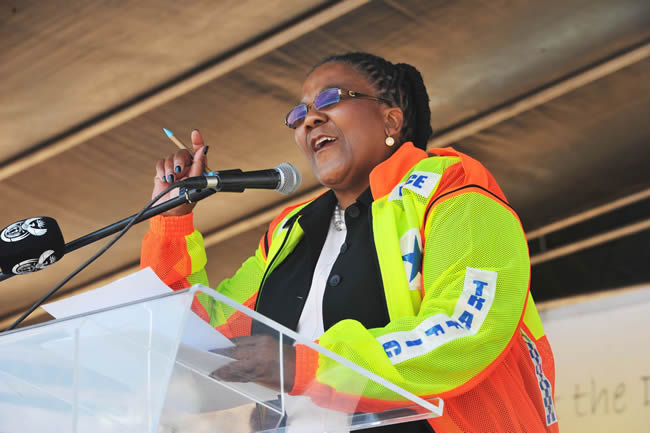 Transport Minister Dipuo Peters has encouraged South Africans to register their companies in different databases within all spheres of government in order to take advantage of the many business opportunities.
Transport Minister Dipuo Peters has encouraged South Africans to register their companies in different databases within all spheres of government in order to take advantage of the many business opportunities.
“We made a commitment of procuring 75 percent of government goods and services from South African producers,” Minister Peters said recently.
Public Works bursaries change lives
Public Works bursaries change lives andileAdopting the habit of working hard from an early age is what secured a bright future for an aspirant mechanical engineer, Olwethu Bitterhout, from the Eastern Cape.
He is one of the 40 beneficiaries from the Class of 2016, who received bursary awards worth R130 000 from the Department of Public Works’ Schools Programme.
Bitterhout matriculated from Solomon Mahlangu Secondary School in the Eastern Cape and obtained seven distinctions.
“The only way I managed to get good results was through hard work. I have always been a top achiever. It became a habit to me,” said 18-year-old Bitterhout. 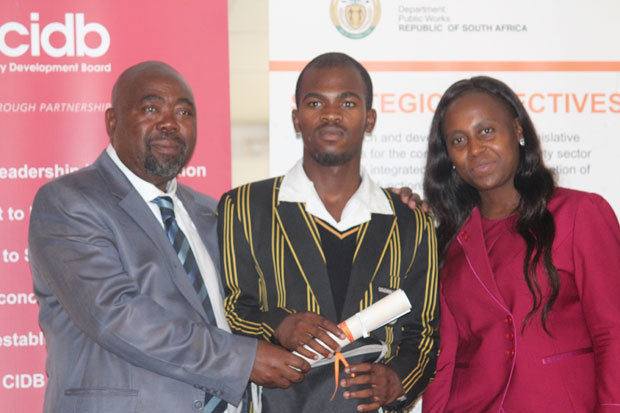
He said maintaining good grades throughout his school years was motivated by a fear of disappointing his parents.
“My parents see me as someone who will change their lives.”
Bitterhout hopes to give back to his community once he completes his studies and establishes a career for himself.
Bitterhout will be pursuing his post-matric qualification at the University of Cape Town, starting his first year in 2017.
Two young women amongst the beneficiaries from E.P.P. Mhinga Secondary School in Malamulele in Limpopo, expressed their gratitude to the Department of Public Works. Both Hlavutelo Baloyi and Saqwadi Chavalala also passed matric with seven distinctions, and have enrolled with the University of Cape Town to study for a BSc Actuarial Science.
Chavalala (18) was brought up by a single mother, who also takes care of Chavalala’s three cousins. Although her mother works, Chavalala said she cannot afford university fees.
Her fellow learner, Baloyi (16) is one of four children raised by her single mother. She said she was proud of herself for working hard and being awarded the bursary to further her studies.
“University fees are expensive, so this was a relief to my mother as well,” she said.
The two advised the Class of 2017 to never let external factors like community protests affect their studies and to focus on their studies. They also called on parents and educators to give learners the necessary support, as this is part of the recipe for getting good marks.
Rural cooperatives generate millions
Rural cooperatives generate millions andileGovernment funding is giving farmers in the Eastern Cape a boost.
Eastern Cape farmers are now participants in the agro-processing value chain, thanks to government funding.
In March this year, Eastern Cape Rural Development and Agrarian Reform MEC Mlibo Qoboshiyane introduced branded maize products produced by six Mqanduli farming cooperatives to the local retail sector.
For the first time the farmers were able to sell their super maize meal and samp at a retail supermarket in King Williams Town. Their product is available in 10.5kg, 12.5kg and 40kg packs.
This move also saw the launch of the rural cooperatives from the Mqanduli Rural Enterprise Development (RED) Hub as commercial farmers and food processors. 
The government-funded Mqanuli RED Hub, which is in its third year, has potential to generate income for the roughly 300 farmers who run it, said Mqanduli RED hubs representative Sithembele Zibi who is a qualified lawyer.
“This RED Hub programme takes our produce through the value chain until it reaches the market and it has changed our lives. As we speak our children are employed as tractor drivers or in the milling plants where they are getting trained,” said Zibi.
MEC Qoboshiyane encouraged communities to use the land to be productive.
“We must understand we are now joining a serious business. If we don’t produce, food will be expensive. If you are given a house free of charge, cultivate the land so that you can eat and sell the surplus.”
Presenting Eastern Cape Rural Development Agency (ECRDA)’s latest annual results, ECRDA chief executive Thozamile Gwanya said the provincial agricultural development agency had approved R14.8 million in loans to rural entrepreneurs in the 2015/16 financial year.
“Besides the loan facility that was made for maize crop production at the Mqanduli and Ncora RED hubs, there are also informal groups of subsistence farmers who, because of their small pockets of land, are encouraged to apply as groups in order to qualify for production loans,” Gwanya
explained.
Seasoned furniture makers get funding
Seasoned furniture makers get funding andileAfter running a furniture business for more than 20 years, Timothy Nhlengethwa almost gave up on his passion when his business was no longer making a profit.
While attending Comprehensive Rural Development Programme meetings in Mkhondo where he sits as the chairperson of the local cooperatives, Nhlengethwa heard about assistance offered by the Department of Rural Development and Land Reform to rural enterprises that could help his business.
He made enquiries and eventually submitted his request on behalf of One-goal Multiservice which was approved in 2014.
Through the Rural Enterprise and Industrial Development branch the department bought furniture material, machinery and protective clothing for the cooperative.
The cooperative is made up of five members including Nhlengethwa, who is the chairperson, three young people and two adults. 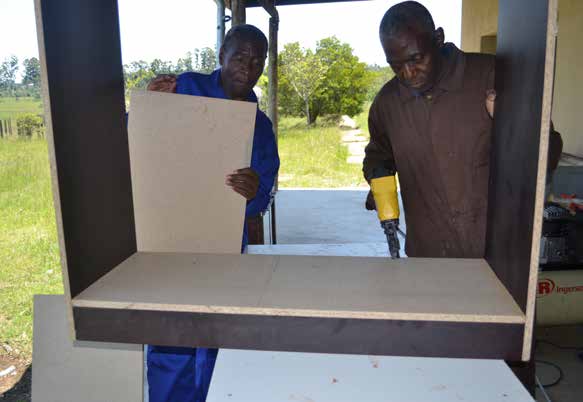
The cooperative works from rented premises belonging to Mkhondo Local Municipality. Their products include chests of drawers, kitchen and bedroom cupboards as well as filing and display cabinets.
The deputy chairperson of the cooperative, Bongani Mhlongo said they hope to grow the business and attract more customers.
“We also require a showroom where we can … display our products as well,” said Mhlongo. Their current premises are not big enough for them to use as a showroom but they are optimistic that their search for a bigger space will come to fruition once the business grows.
*Zithini Dlamini works for the Mpumalanga Department of Rural Development and Land Reform.
The State of the Nation Address
The State of the Nation Address Joy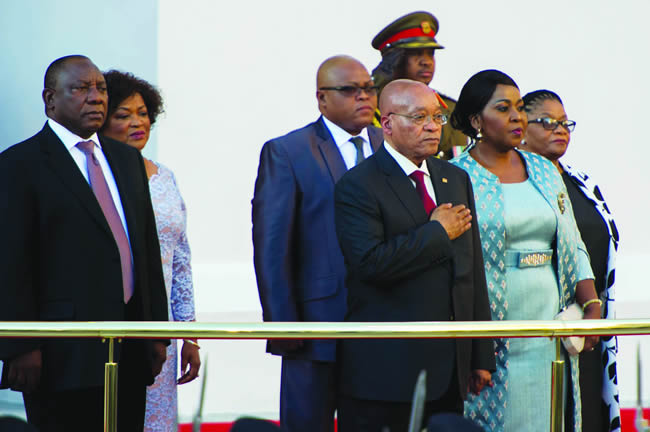 SoNA Special Feature
SoNA Special Feature
At the Opening of Parliament every February, the President of South Africa delivers the State of the Nation Address (SoNA), which outlines the country’s performance for the past year and plans for the year ahead.
During the SoNA the President addresses a joint sitting of the two houses of Parliament, the National Assembly and the National Council of Provinces. It focuses on the current political and socio-economic state of the nation.
President Jacob Zuma will deliver his ninth SoNA on 9 February where he will also outline government's Programme of Action (POA) for the year ahead. The POA is a system that monitors the implementation of the Medium-Term Strategic Framework (MTSF). The MTSF is government’s strategic plan for the 2014-2019 electoral term and the first five-year implementation phase of the National Development Plan. In keeping with customary proceedings, before the President makes his way into the National Assembly Chamber some ceremonial activities and cultural performances usually take place along the route and outside of Parliament. Cultural groups perform along the President’s route from the Slave Lodge to the National Assembly.
The significance of some of those activities:
The Presidential procession to the National Assembly Chamber
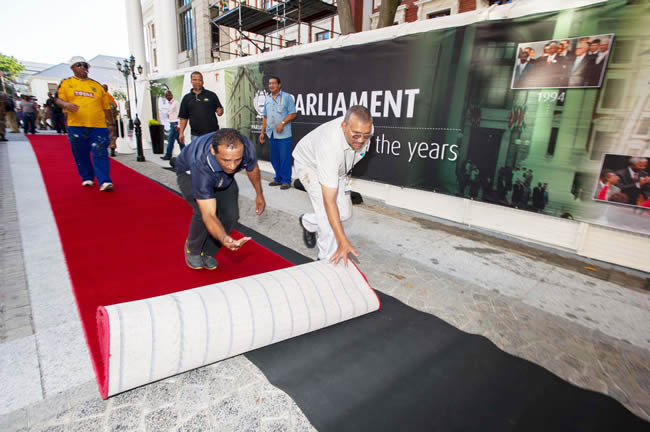 The ceremony, which starts at the Slave Lodge just outside the entrance to the Parliamentary Precinct, is a combination of public participation and a formal state ceremony.
The ceremony, which starts at the Slave Lodge just outside the entrance to the Parliamentary Precinct, is a combination of public participation and a formal state ceremony.
As part of making Parliament more accessible to the people and to facilitate public involvement in law-making and other parliamentary processes, the public participates in the procession. This concept of public participation was introduced by former President Nelson Mandela.
Members of the public, including a Junior Guard of Honour (from the entrance of the Parliamentary Precinct to the end of the National Council of Provinces building), a Civil Guard of Honour and nine Eminent Persons, line the red carpet until the end of the Old Assembly Wing.
From the end of the Old Assembly building, the procession becomes part of a formal, state ceremony.
A Ceremonial Military Guard of Honour takes up positions in front of the National Assembly building and a military band sets up to the right of the building (the side nearest Tuynhuys) and plays the national anthem.
There is a 21-gun salute and an air force fly-past while the President takes the national salute from a special dais in front of the National Assembly building.
The 21-gun salute
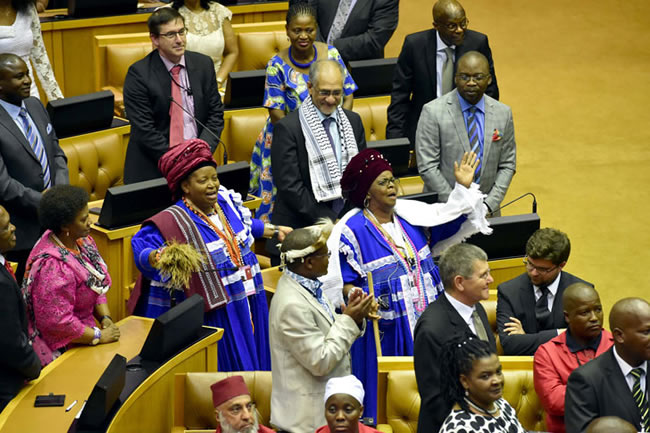 The tradition of bestowing a salute by firing cannons originated in the 14th century when cannons and firearms came into use. In 1842, the 21-gun salute became the international norm for the highest honour a nation rendered and it is fired in honour of the Head of State, the national flag, the Head of State of a foreign nation, a member of a reigning royal family and a former Head of State.
The tradition of bestowing a salute by firing cannons originated in the 14th century when cannons and firearms came into use. In 1842, the 21-gun salute became the international norm for the highest honour a nation rendered and it is fired in honour of the Head of State, the national flag, the Head of State of a foreign nation, a member of a reigning royal family and a former Head of State.
The red carpet
The original concept of rolling out the red carpet was originally reserved for kings and queens and signified a welcome of great hospitality and ceremony. Over time, the red carpet has been used to welcome Heads of State.
The presence of a praise singer
Praise singers have been a feature of the SoNA ceremony since 2005. Since then they have come from a variety of provinces and languages.
What happens after the State of the Nation Address?
- Political parties have an opportunity to debate, comment and raise questions on matters addressed in the President’s speech during a debate on the President’s State of the Nation Address.
- This debate usually takes place over two days in a joint sitting.
- The President will have the opportunity to reply to the debate.
Interesting fact
All guests in the public galleries of the National Assembly Chamber are able to listen to the SoNA in the language of their choice.
Besides the interpretation of the address into all 11 official languages, there is also South African Sign Language interpreting available for deaf people. Tactile interpretation is also available for Deafblind people present at Parliament.
The State of the Nation Address will be broadcast live on:
• SABC radio stations • SABC TV • Parliament TV (DStv Channel 408)
Incubator to grow tourism sector in NW
Incubator to grow tourism sector in NW Estelle GreeffSmall businesses in the tourism sector situated in the Pilanesberg in North West are set to benefit from a newly-established incubation programme
![The Tourism Enterprise Development Incubator will give small businesses in the sector a boost. [The Tourism Enterprise Development Incubator will give small businesses in the sector a boost. [The Tourism Enterprise Development Incubator will give small businesses in the sector a boost. [Photo: RoomsForAfrica.com] The Tourism Enterprise Development Incubator will give small businesses in the sector a boost. [ Photo: RoomsForAfrica.com ]](/sites/default/files/images2017_02_01/p12_incubator-tourismnw.jpg) The Department of Tourism has launched the Tourism Enterprise Development Incubator which will be a virtual vehicle used to provide support to small business.
The Department of Tourism has launched the Tourism Enterprise Development Incubator which will be a virtual vehicle used to provide support to small business.
“The programme will focus on viable existing small, micro and medium enterprises (SMMEs) at the selected tourism nodes. The SMMEs must be affiliated to a local tourism association and be operational.
There is no turnover requirement for participation by SMMEs but those that fit the official description of SMMEs in line with the Small Development Act will be considered in the evaluation of suitability for inclusion in the incubator, said Minister of Tourism Derek Hanekom during the launch.
He said the success of the incubator programme relies on the involvement of the community.
“The success of our programmes is dependent on quality leadership as well as a stable and willing community that is hungry for success. That hunger will create opportunities for our people.”
Speaking on behalf of the 50 incubatees, chairperson of the Bojanala Tour Operators Association Lester Ntsabo said the programme would ensure sustainable growth in their businesses.
“As tourism business owners we really need this kind of support to grow our businesses. Tourism is one of the most influential sectors used to drive our economy and it is necessary for tourism businesses to be capacitated and supported by government,” said Ntsabo.
Echoing Ntsabo’s sentiments was Zinzi Lekoalo who owns a guesthouse in Mogwase. She started her business in 2011 with only four rooms. Today her guesthouse has grown and currently has 25 rooms, a boardroom, conference centre, a bar and restaurant.
She said she is hopeful that this will help the businesses in and around the Pilanesberg tourism node.
“We’ve got very high expectations especially those that would like to grow their businesses. They will point us the in the right direction.”
The department will help the 50 businesses to access more markets, and with mentoring and financial management.
The incubator programme will also be launched in Mpumalanga.
From security guard to employer
From security guard to employer Estelle GreeffThe story of Elliot Marobela is one of hard work and the determination to succeed at all costs.
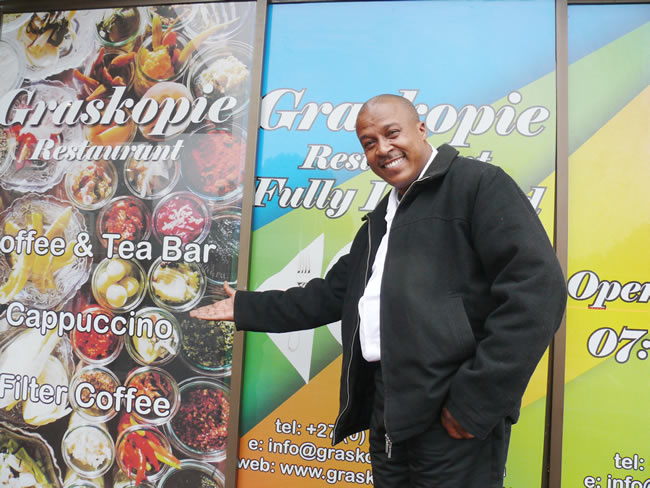 Marobela is putting down roots near his place of birth, thanks to a public-private partnership (PPP) with Thaba Chweu Municipality.
Marobela is putting down roots near his place of birth, thanks to a public-private partnership (PPP) with Thaba Chweu Municipality.
Born in Matibidi, 50km away from Graskop, he is the operator of the Graskop Holiday Resort, which employs 26 people. His is a tale of hard work and perseverance that saw him achieving notable success despite a rural background and few education opportunities.
His first job was as a security guard at Overvaal Oorde. With time, the position allowed him to assist with simple night receptionist duties. For five years he worked and studied, doing courses through Damelin and obtaining an Office Administration Diploma while working as a part-time receptionist when off duty as a security guard. Soon he was a full-time receptionist and not long after, was made housekeeping executive at Warmbaths.
Under his guidance, the housekeeping staff achieved two bonuses that year, said Marobela.
In keeping with a changing South Africa, Overvaal Oorde repositioned itself as Aventura (today Forever Resorts) and Marobela benefitted from a learnership with the Hospitality Industry Training Board that saw him being rotated throughout the group’s resorts.
He worked his way up within the group and managed to get a hotel management qualification. In 2008, he took over the management of a small and trouble-plagued resort in White River and was charged with managing its turnaround.
After 22 years in the hospitality industry, Marobela decided to leave the Forever group. He did consulting work for other lodges and took over a guesthouse and restaurant in Sabie.
Then, in 2013, he learnt that Thaba Chweu Municipality was looking for a local person with the relevant experience to enter into a PPP to revitalise the once thriving Graskop Holiday Resort, which had been run-down for some time.
Marobela’s Sre and Jre Investments and Trading (Pty) Ltd was chosen as the preferred bidder on 24 October, 2013. The signing of the 15-year contract took place a year later, in 2014.
Whilst Marobela has been unable to secure government funding, he is in negotiations with the Industrial Development Corporation.
The resort, which re-opened its doors in April 2015, has 26 newly-renovated self-catering units, and another 12 rondavels are under way. It also has a caravan site which is 90 percent complete.
The resort – on the edge of an escarpment, within walking distance of town and a short drive from major Mpumalanga tourist attractions – will soon be graded and Marobela is hoping to be awarded three stars.
Jobs: Labour Feb 2017
Jobs: Labour Feb 2017 Estelle GreeffAssistant Director: COIDA (2 posts)
Centre: Labour Centre: Bethlehem (1 post), Welkom (1 post)
Reference No: HR4/4/8/59
Salary: Commencing R 311 784 per annum
Enquiries: Ms A Marais, Tel: 051 5056 248
Requirements: Three year tertiary qualification degree / diploma in Public Management / Administration / Social Science / OHS / Finance and HRM are required. A medical background will be an added advantage e.g Professional nurse. Five (5) to (8) eight years supervisory experience in compensation of claims and medical claims processing. Valid drivers licence. Knowledge: ● Public Services, DoL and Compensation Fund business strategies and goals ● Directorate goals and performance requirement ● Compensation Fund Services ● Compensation Fund Value Chain and business processes ● Public Service, DoL and COID Act, regulations, policies and procedures ● PFMA and Treasury Regulations ● Relevant stakeholders ● Customer Service( Batho Pele Principles) ●Fund Values● Fund IT Operating System ●Required IT ● DPSA guidelines on COIDA. Skills ●Required Technical Proficiency ● business writing ● Strategic Leadership ● Programme and Project Management ● Financial Management ● Change Management ● Knowledge management ● Service Delivery Innovation ● Planning and Organizing● Problem Solving and Analysis ● Decision Making ● Accountability● People Management and Empowerment● Communication● Client orientation● Work Ethics and self management ●Risk Management and Corporate Governance.
Duties: ●Work scheduling ● Provide oversight and control to claims processing and employer assessment processes as required in terms of segregation of duties ● Manage the resolution of all COID enquiries● Manage the quality assurance on all COID claims and employer registrations and assessments● Provide technical advice and guidance on finalization of all COID activities● Assist in the management of the sub-directorate.
Deliver applications: Chief Director: Provincial Operations: P O Box 522, Bloemfontein, 9300 or hand deliver at Laboria House, 43 Charlotte Maxeke Street, Bloemfontein
Assistant Director: Anti Fraud and Anti Corruption
Centre: Provincial Office: KwaZulu-Natal
Reference No: HR4/4/5/71
Salary: Commencing R311 784 per annum
Enquiries: Ms JKC Manogaran, Tel: 031 366 2013
Requirements: Three years tertiary qualification in Risk Management / Internal Audit/ Compliance Management Two (2) years supervisory experience. Two (2) years functional experience in Fraud and corruption. A valid driver’s licence. Knowledge: ● Public Financial Management Act ● Risk Management Strategy ● Risk Management Policy ● Fraud Prevention Plan ● Promotion of Access to information Act ● Basic Condition of Employment ● Protected Disclosure Act ●Labour Relations ● Public Service Regulations ● Public Service Act ● Unemployment Insurance Act ● Unemployment Insurance Contribution Act. Skills: ●People Management ● Conflict Management ● Analysis ● Problem Solving ●Presentation ● Planning and Organising ●Communication ● Computer Literacy ● Report writing ● Driving ● Creativity ● Numeracy.
Duties: Initiate and manage the investigation of all reported incidents of fraud and corruption ● Manage the fraud hotline and case database ● Conduct and manage fraud and corruption risk assessment ● Manage resources (Human, Financial, Equipment/Assets in the section.
Deliver applications: Chief Director: Provincial Operations: P O Box 940, Durban, 4000 or hand deliver at 267 Anton Lambede Street, Royal Hotel Building, Durban
Assistant Director: Financial Liaison – Public Entities
Centre: Chief Directorate: Financial Management, Head Office
Reference No: HR 4/17/02/03HO
Salary: Commencing: R 311 784.00 per annum
Enquiries: Mr F Petersen, Tel: 012 309 4114
Requirements: Three year relevant tertiary qualification in Financial Management / Accounting. Two (2) years supervisory experience. Two (2) years functional experience in oversight of SOEs (State Owned Entities)/ Financial Management/Accounting. Knowledge: ●Applicable legislative and regulatory framework (i.e. Labour) ●Public Finance and Management Act (PFMA), Treasury Regulations and guidelines ●Organisational and government structures ● Internal audit concepts, frameworks and methodologies ●Public Sector Risk Management Framework ●King Report on Corporate governance (II and III), ●General Recognised Accounting Practice (GRAP). Skills: ●Planning and organizing ●Communication (Written and Verbal) ●Problem solving ●Leadership ●Conflict and Diversity Management ●Presentation ●Analytical ●Financial and Performance Report writing.
Duties: ●Monitor and advise SOE’s on governance compliance issues ●Monitor and advise SOE’s on financial governance and financial oversight ●Evaluate the financial performance and positions of businesses in determining affordability of the Ministerial variations from sectoral determinations ●Supervise the resources of the directorate
Deliver applications: Chief Director: Human Resources Management: Private Bag X 117, Pretoria, 0001 or hand deliver at 215 Francis Baard Street.
Assistant Director: Risk Management
Centre: Directorate: Risk Management, Head Office
Reference No: HR 4/17/02/02HO
Salary: Commencing R 311 784 per annum
Enquiries: Mr A Ngxanga, Tel: (012) 309 4166
Requirements: Three year tertiary qualification in Risk Management/Internal Auditing/ Accounting/Economics. Two (2) years supervisory experience. Two (2) years functional experience in Risk Management/ Internal Audit services. Valid driver’s license. Knowledge: ● Public Sector Risk Management framework ● COSO Framework ● King report on Corporate Governance ● Public Finance Management Act● Treasury Regulation● Protected Disclosure Act ● Anti fraud and corruption policies● Criminal and Commercial Law ● Labour Relations, legislation, policies and procedures ● Basic Conditions of Employment Act ● Public Service Act. Skills: ● Analytical● Strategic Management● Financial Management ● Facilitation● Investigation ● Interviewing● People Management● Computer literacy● Time Management● Communication● Interpersonal● Presentation● Planning and organizing.
Duties: ●Implement Risk management strategies/ policies and systems for the Department ● promote risk awareness culture and conduct risk assessment throughout the Department through communication and training programmes ● Implement integrated risk management framework for all aspects of risk across the Department ● Manage fraud and corruption investigations in the Department ● Manage resources within Risk Management Unit.
Deliver applications: Chief Director: Human Resources Management: Private Bag X 117, Pretoria, 0001 or hand deliver at 215 Francis Baard Street.
Deputy Director: Collective Bargaining
Centre: Branch: Labour Policy and Industrial Relations, Head Office
Reference No: HR 4/17/02/01 HO
Salary: All inclusive: R 726 276 per annum
Enquiries: Mr I Macun, Tel. 012 309 4634
Requirements: Three year relevant tertiary in Labour Relations/Human Resource Management/Law. Two (2) management experience. Three years (3) functional experience in Labour Relations/Collective bargaining. A valid driver’s licence. Knowledge: ● Public service transformation and management issues ● White Paper on transformation of Public Service ● Public Service Act ● Ability to convert policy into action ● Public Service Regulations and relevant prescripts ● Departmental policies and procedures ● Accounting systems and Internal Control ● Batho Pele Principles. Skills: ● Administration and financial management● Communication (verbal and written) ● Computer literacy ● Project management ● Strategic management● Analytical● Problem solving● Conflict management● Innovative.
Duties: ● Manage and regulate the registration of labour organisations ● Monitor compliance of labour organisations in terms of legislation ● Manage the extension of collective agreements ● Strengthen the capacity of labour market institutions ● Manage resources of the Sub-Directorate such as HR, Finance, assets and etc.
Deliver applications: Chief Director: Human Resources Management: Private Bag X 117, Pretoria, 0001 or hand deliver at 215 Francis Baard Street.
Principal Inspector: Employer Audit
Centre: Provincial Office: Northern Cape
Reference No: HR 4/4/8/243
Salary: Commencing: R 389 145 per annum
Enquiries: Mr E Qhalane, Tel: 053 838 1500
Requirements: Three (3) year relevant tertiary qualification with either Accounting/Finance/Internal Auditing. Two (2) years supervisory experience. Two (2) years functional experience in Auditing/Financial Management. Valid drivers licence. Knowledge:● Departmental Policies and Procedures ● Batho Pele Principles ● Public Service Act and Regulations ● OHS Act and Regulations ● COIDA ● UIA ● PFMA ● BCEA ●SDLA ● LRA ● UI Contribution Act ● Skills Development Act ●Employment Equity Act. Skills: ● Facilitation ● Planning and Organizing ● Computer literacy ● Interpersonal ● Problem Solving.
Duties: ● Monitor the the implementation of UIA and COIDA strategy programs. ● Implement the systems that provide expert advice on sector specific UIA & COIDA matters ● Control the process that monitor and evaluate impact of UIA & COIDA programs ● Monitor the implementation of Advocacy Campaigns on COIDA regularly and when there are amendments.
Deliver applications: Chief Director: Human Resources Operations: Private Bag X 5012, Kimberley 8301
Pupil Inspector (Learner Inspector): IES (3 posts)
Centre: Branch: Inspection and Enforcement Services, Head Office
Reference No: HR 4/17/02/04 HO
Salary: Commencing: R 100 545 per annum
Enquiries: Mr Lucas Masango, Tel: 012 309 4398
Requirements: Prospective students who have successfully completed their Matriculation with a pass of 60% in Mathematics and Physical Science or currently busy with matriculation or completed their matric still at home or those who are already registered with Universities or University of Technologies wishing to further their studies with recognised higher learning institutions in one of the following fields are requested to apply: ●Electrical Engineering (Heavy and Light current) ●Chemical Engineering ●Civil Engineering ●Mechanical Engineering ●Environmental Health Science. (Students with bursaries or other source of finance should not apply). ●Covering letter indicating your preferred field of study ●Certified copy of results from Universities or Universities of Technology for those students who are already registered with higher learning institutions● Application form (Z83) ●Curriculum vitae ●Certified copy of Matriculation Certificate ●Certified copy of your ID Book. Successful candidate will sign a contract with the Department of Labour which will be stipulating the terms and conditions.
Deliver applications: Chief Director: Human Resources Management: Private Bag X 117, Pretoria, 0001 or hand deliver at 215 Francis Baard Street.
Chief Director: Provincial Operations
Centre: Provincial Office: Free State
Reference No: HR 4/17/02/06HO
Salary: All inclusive package R1 068 564 per annum
Enquiries: Ms MM Matyila, Tel 012 309 4026
Requirements: Three (3) year Degree (NQF level 7 as recognised by SAQA) in Management /Public Administration/Business Administration /Public Management/ Business Management. Five years of experience at a senior managerial level. Five years functional experience in operational / administrative service. A valid driver’s licence. Knowledge: ●Recruitment and Selection ●Human Resource administration ● Relevant legislation in Labour Relations Act ● Public Service Regulation Act● Basic Condition of Employment Act ●Departmental Policies and procedures ●Public Finance Management Act ● Project Management ● Batho Pele Principles. Skills: ●Management ●Interpersonal ●Verbal and written communication ● Computer literacy ● Negotiation● Presentation.
Duties: ● Develop and manage the effective implementation of Inspection and Enforcement Services including the specialization model ● Manage Labour Market Information system services in the Province ● Develop and manage effective implementation of Public Employment Services ● Manage implementation of Management Support Services and financial management in line with relevant prescripts ● Manage strategic plan of integrated beneficiary service in the Province in line with the relevant prescripts ● Develop strategic plan to reach the community of the Province ● Promote sound work ethics on service delivery ● Establish and maintain partnerships and working relations with key relevant stakeholders ● Manage all resources within the Chief Directorate
Deliver applications: Chief Director: Human Resources Management, Department of Labour, Private Bag X117, Pretoria, 0001 or hand deliver at 215 Francis Baard Street, Pretoria, Laboria House, Department of Labour (HQ)
Please note: No late applications will be accepted
Full details of the advertised posts visit our website: www.labour.gov.za
Applications must be submitted on form Z83, obtainable from any Public Service Department or on the internet at www.gov.za/documents. The fully completed and signed form Z83 should be accompanied by a recently updated, comprehensive CV as well as recently certified copies of all qualification(s) including a Senior Certificate and ID-document [Driver’s license where applicable]. Non-RSA Citizens/Permanent Resident Permit Holders must attach a copy of their Permanent Residence Permits to their applications. Should you be in possession of a foreign qualification, it must be accompanied by an evaluation certificate from the South African Qualification Authority (SAQA). Applicants who do not comply with the above-mentioned requirements, as well as applications received late, will not be considered. The Department does not accept applications via fax or email. Failure to submit all the requested documents will result in the application not being considered. Correspondence will be limited to short-listed candidates only. If you have not been contacted within eight (8) weeks after the closing date of this advertisement, please accept that your application was unsuccessful. Suitable candidates will be subjected to a personnel suitability check (criminal record, citizenship, credit record checks, qualification verification and employment verification). Where applicable, candidates will be subjected to a skills/knowledge test. All shortlisted candidates for SMS posts will be subjected to a technical competency exercise that intends to test relevant technical elements of the job, the logistics of which be communicated by the Department. Following the interview and technical exercise, the selection panel will recommend candidates to attend generic managerial competencies using the mandated DPSA SMS competency assessment tools. Successful candidates will be appointed on a probation period of 12 months. The Department reserves the right not to make any appointment(s) to the above post. The successful candidate will be expected to sign a performance agreement. The Department of Labour is an equal opportunity affirmative action employer. The employment decision shall be informed by the Employment Equity Plan of the Department. It is the Department’s intention to promote equity (race, gender and disability) through the filling of this post(s) with a candidate whose transfer / promotion / appointment will promote representativity in line with the numerical targets as contained in our Employment Equity Plan.
Closing date for applications: Monday, 20 February 2017 at 16:00
SAPO board member nominations
SAPO board member nominations Estelle GreeffInvitation of nominations for appointments as non-executive members of the Board of the South African Post Office (SAPO)
Dr Siyabonga Cyprian Cwele, MP, the Minister of Telecommunications and Postal Services, invites the public to nominate persons for appointment as non-executive members of the Board of the South African Post Office SOC Ltd, in terms of section 11(1)(a) of the South African Post Office SOC Ltd Act of 2011, as amended.
Written nominations must contain the following:
In respect of the nominator; a signed nomination letter bearing the full name, identity number, physical and postal address, telephone number, e-mail address of the nominator.
In respect of the nominee, a signed letter of acceptance of the nomination must be accompanied by:
A comprehensive curriculum vitae (CV) and Certified proof of academic qualifications and identity documents (ID). The CV must have the following information: identity number, physical and postal addresses; telephone and facsimile number; e-mail address. An indication of representation of people with disabilities is required where applicable;
Candidates must possess skills, knowledge, qualifications and experience in one or more of the following:
- financial and risk management
- postal services and postal service management
- banking business
- ICT and e-commerce
- project management
- governance compliance
- logistics
Possession of the following will be an advantage:
- Public Sector leadership and experience in relevant legislation and regulation like SAPO Act, Postbank Act, ECA, PFMA
- Chartered Accountant SA or equivalent qualification
- Qualification at NQF Level 7 or above.
Successful candidates must submit themselves to verification of qualifications and security clearance.;
Nominations and applications must be addressed to:
Mr J Masango at Private Bag X 860, Pretoria, 0001; or
Email to: jmasango@dtps.gov.za; or
Hand delivered to: The Department of Telecommunications and Postal Services, Block B, iParioli Office Park, 399 Jan Shoba Street, Hatfield, PRETORIA.
Enquiries: Mr J Masango 012 427 8243
Closing date for nominations: 10 February 2017
Change of address and contact details of National Consumer Commission
Change of address and contact details of National Consumer Commission Estelle Greeff Change of address and contact details of the National Consumer Commission
Change of address and contact details of the National Consumer Commission
Dear Consumers
Please be advised that our offices have moved to a new premises, and that we now have new contact details where you can reach us for cost free assistance with your consumer disputes.
Contact centre number Tel: 012 428 7000
Postal address
National Consumer Commission
P.O Box 36628
Menlo park
0102
Physical address
Building C, South African
Bureau of Standards campus,
1 Dr. Lategan Road, Groenkloof, Pretoria
AU's plan for Africa We Want
AU's plan for Africa We Want Estelle GreeffAfrican news
The African Union (AU) is working to address the paradox of the two Africas by 2063.
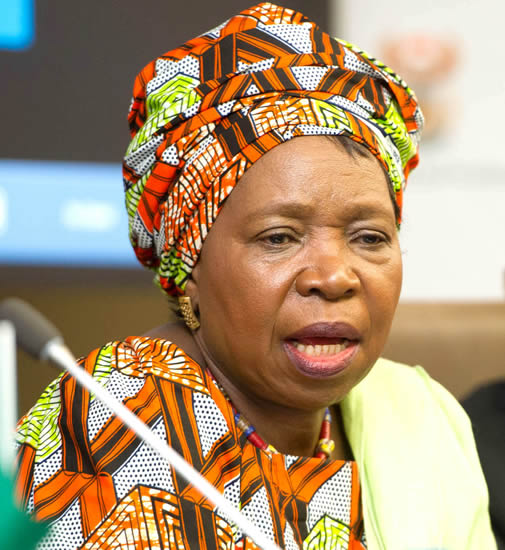 The AU aims to realise its vision of an integrated, peaceful and prosperous Africa driven by its own citizens and playing a dynamic role in the world.
The AU aims to realise its vision of an integrated, peaceful and prosperous Africa driven by its own citizens and playing a dynamic role in the world.
This is according to former AU Commission Chair Dr Nkosazana Dlamini Zuma who delivered the State of the African Union address in eThekwini in KwaZulu-Natal late in December 2016.
Dlamini Zuma recalled that in 2013 the AU had recommitted itself to “complete the decolonisation process, to protect the right to self-determination of African people still under colonial rule, pledge solidarity with people of African descent and the African Diaspora in their struggles against racial discrimination.”
Agenda 2063 is a plan for prosperity
Africa has been referred to as ’the development challenge of the 21st century’ so the goal of the AU is for the continent
to enter an era of “Africa rising” said Dlamini Zuma.
Despite its relatively young and rapidly urbanising population, abundant mineral oils and gas resources, productive land, diverse eco-systems and fauna and flora, the paradox of a rich and a poor Africa remains in place. Of the 48 least developed countries in the world, 34 are in Africa.
“The commitment to create a prosperous continent is at the centre of our continental framework to move from the Africa we have to the Africa We Want by the year 2063 through Agenda 2063,” said Dlamini Zuma.
Agenda 2063 is a pledge to place African people, especially children, the youth, women and the elderly at the centre of the AU’s work.
“The framework draws lessons from past experiences and programmes.” These lessons were discovered through “unscripted consultations with various stakeholders and sectors including the media, academia, cultural workers, youth, women and the private sector,” said Dlamini Zuma.
Agriculture drives African economies
Agriculture drives African economies Estelle GreeffAfrica news
Growing the agribusiness sector can mean big business for Africa.
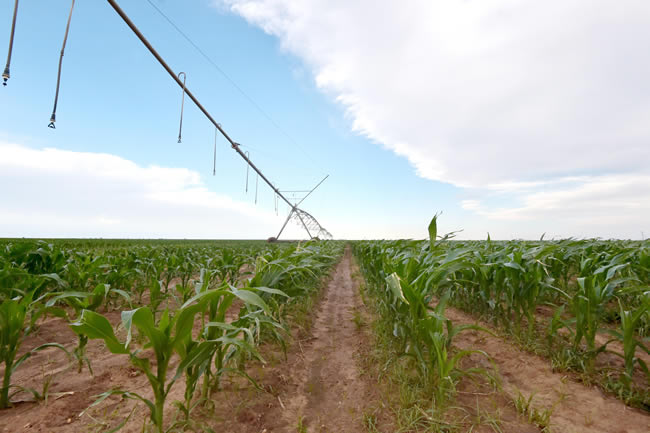 The agricultural sector lies at the heart of Africa’s economies, contributing on average over 30 percent of Gross Domestic Product in Africa, said former African Union (AU) Commission Chair Dr Nkosazana Dlamini Zuma during her 2016 State of the AU Address in eThekwini in December.
The agricultural sector lies at the heart of Africa’s economies, contributing on average over 30 percent of Gross Domestic Product in Africa, said former African Union (AU) Commission Chair Dr Nkosazana Dlamini Zuma during her 2016 State of the AU Address in eThekwini in December.
She said the World Bank projected that by 2030 agriculture and agribusinesses will have grown to a US$1 trillion sector. Today it is worth US$313 billion and should be a top developmental priority in Africa.
In 2003 African leaders agreed to implement the Comprehensive Africa Agriculture Development Programme as a development framework calling for a 6 percent annual increase in agricultural output.
Dlamini Zuma pointed out that more youthful people and also women had to be drawn to the agriculture sector as it is one of the few which has an ageing population. In this regard, thousands of women recently converged at Mount Kilimanjaro and adopted a charter on women’s land rights.
“Innovations and the employ of new efficient and effective technologies is key so that we may transform the sector and increase agroprocessing and [agribusiness] components.”
In this regard, the growth in Information Communication Technology in Africa has driven innovations. These include farmers’ access to information.
“This will also need to be complemented by enhancing investments to finance agriculture and to end hunger by 2025 through sustainable agricultural production and marketing. We must also find ways to promote climate smart and innovative agriculture and agroprocessing,” said Dlamini Zuma.
To achieve this, innovative research, education and training approaches are necessary.
Educated people are the wealth of nations
Educated people are the wealth of nations Estelle GreeffAfrica news
Investment in Africa’s people remains central to all African Union (AU) undertakings because people are the real wealth of nations. This is according to former AU Commission Chair Dr Nkosazana Dlamini Zuma.
The AU is pushing for expanded access so all African children complete secondary education. To prevent children from leaving school, the AU has a focused End Child Marriage Campaign, said Dlamini Zuma.
“We also advocate and work with member states on improvements in the conditions of teachers, upgrading their skills, expanding school feeding programmes in all schools, for a focus on the teaching of science, mathematics and engineering and on strengthening of technical vocational education and training,” said Dlamini Zuma.
Overcoming the shortage of Science, Technology, Engineering, and Mathematics (STEM) is also important and the AU has called for a skills revolution so that African countries can modernise their economies.
The Capacity Building Foundation’s study found that 90 percent of graduates qualify in the Social Sciences. The rest qualify in STEM. The AU’s aim is to raise the number of STEM graduates to 70 percent.
The AU Harmonisation and Tuning project involves 200 universities in 42 countries. Its aim is harmonised curricula, quality and qualifications in Medicine, Teacher Education, Mechanical Engineering, Agricultural Sciences, Civil Engineering, Geology and Higher Education Management.
“Our efforts in basic education, technical vocational education and training in Science, Engineering and Mathematics education are at the foundation of the skills revolution,” said Dlamini Zuma.
Africa is expanding higher education: Enrolments are up from 2.7 million students in 1991 to over 11 million in 2015 and there are more universities.
Yet, this sector faces problems of funding and relevance in an increasingly knowledge-based global environment, said Dlamini Zuma.
Therefore the AU has launched the Pan African Virtual University using technology to increase access, create centres of excellence, and attract students from across Africa.
Sporting codes to watch in 2017
Sporting codes to watch in 2017 Estelle GreeffSport, arts and culture
An exciting sporting year lies ahead for the country’s big three sporting codes as the Proteas, Bafana Bafana and the Boks clash with their counterparts from across the world in 2017.
 Bafana Bafana will continue with their quest to qualify for the 2018 FIFA World Cup to be played in Russia, while the national cricket team, the Proteas, will later this year compete in the 2017 ICC Champions Trophy.
Bafana Bafana will continue with their quest to qualify for the 2018 FIFA World Cup to be played in Russia, while the national cricket team, the Proteas, will later this year compete in the 2017 ICC Champions Trophy.
The Springboks would look to use the 2017 Rugby Championships to rebuild after a disastrous 2016, when the team lost eight test matches in one year.
Before the ICC Champions Trophy, the Proteas will jet off to New Zealand for a nine-match series with New Zealand.
The series will include one T20I, five One Day Internationals (ODI) and three test matches.
After the New Zealand series, the team will jet off to face old rivals England in a three-match ODI series just before the ICC Champions Trophy.
South Africa vs New Zealand
T20I
Date: 17 February 2017
Venue: Eden Park, Auckland, New Zealand
Time: 8h00
ODIs
Date: 19 February 2017
Venue: Seddon Park, New Zealand
Time: 03h00
Date: 22 February 2017
Venue: Hagley Oval, Christchurch
Date: 25 February 2017
Venue: Westpac Stadium, Wellington
Time: 03h00
Date: 1 March 2017
Venue: McLean Park, Napier
Time: 03h00
Date: 4 March 2017
Venue: Eden Park
Time: 03h00
Test series
Date: 8 March 2017
Venue: University
Oval, Dunedin
Date: 16 March 2017
Venue: Basin Reserve, Wellington
Date: 25 March 2017
Venue: Seddon Park, Hamilton
South Africa vs England
Date: 24 May 2017
Venue: Headingly, Leeds
Time: 12h00
Date: 27 May 2017
Venue: The Rose Bowl, Southampton
Time: 12h00
Date: 29 May 2017
Venue: Lord’s, London
Time: 12h00
ICC Champion's Trophy
South Africa vs Sri Lanka
Date: 3 June 2017
Venue: Kennington Oval, London
Time: 11h30
South Africa vs Pakistan
Date: 7 June 2017
Venue: Edgbaston, Birmingham
Time: 14h30
South Africa vs India
Date: 11 June 2017
Venue: Kennington Oval, London
Time: 11h30
The Springboks will take on France in the Castle Lager Incoming Series to be played in Pretoria, Johannesburg and Durban. The fixtures are as follows:
Date: 10 June 2017
Venue: Loftus Versfeld, Pretoria
Time: 17h00
Date: 17 June 2017
Venue: Growthpoint Kings Park, Durban
Time: 17h00
Date: 24 June 2017
Time: 17h00
Venue: Emirates Airline Park, Johannesburg
Bafana Bafana will continue with their 2018 FIFA World Cup quest.
The men’s senior national team will play an away and home match against Cape Verde in September followed by a game against Burkina Faso in October and an away game to Senegal in November.
Royal prisoners honoured at the castle
Royal prisoners honoured at the castle Estelle GreeffSport, arts and culture
King Cetshwayo, King Langalibalele, King Sekhukhune and Chief Doman were honoured and remembered when Defence and Military Veterans Minister Nosiviwe Mapisa-Nqakula unveiled statues of them at the Castle of Good Hope in Cape Town recently.
The unveiling was part of the 350-year commemoration of the castle which was part of the colonial government’s exploits from the 17th century.
Inkosi Langalibalele led the Hlubi royal delegation while Chief Basil Coetzee led the delegation representing the Khoi Royal House.
“The statues that you see in front of you is the tangible recognition of these and thousands of other unsung heroes and heroines in colonial wars of resistance.
“It is the beginning of an ongoing commitment to honour all those who gallantly fought against colonial conquest and in turn inspired future generations of freedom fighters,” the Minister said.
The castle, which was first built by Dutch colonists in 1666 after their arrival at the Cape, is associated with many memories of pain and hurt for indigenous tribes encountered on the land at the time.
Built as a military headquarters for the Dutch, the Castle represented colonial injustice, racial oppression and land grabs.
The Minister said while it houses a lot of painful memories, the castle has been revamped and new facilities have been built to promote unity, nation building and social cohesion.
She said the monument should be used as a centre for healing, and all members of the public are encouraged to visit the heritage site.
The castle housed the first formal seat of government until 1811 and also served as prison for high-profile historical figures like King Cetshwayo, Adam Tas, Adam Kok I, King Sekhukhune, and King Langalibalele.
The castle is the oldest building of its kind in South Africa.
To commemorate the castle’s 350 years of existence, government recently gave the monument a R108 million facelift to restore its rich history and heritage. It is hoped that learning about the pain that still exists in the castle walls will foster greater national understanding.